
How one Exonian has changed the way we see climate change




















Although I am writing to you from my third academic year at Exeter School it feels like the first in which my engagement with the alumni community has been anywhere near ‘normal’. I have greatly enjoyed making up for lost time and meeting many of you over the past academic year.
Since the last issue of this magazine we have enjoyed a number of developments at school. Those who have
visited recently will have seen our smart new reception at Manston Terrace (and those who haven’t can see some fantastic images on p13). This is a brilliant development which enables us to welcome visitors to school more effectively whilst safeguarding our pupils.
We have also begun the first stage of our pastoral restructure, with our two new senior leadership positions now in post. We look forward to keeping you updated with further developments in this area.
I want to say a heartfelt thank you to all those alumni who share their time and expertise with our pupils, and particularly to those who support our bursary fund. We are a school of great character offering an exceptional education, and should be accessible to bright children in the local area – thank you for your support which helps us move in this direction.
Whilst there have been many recent changes at school in many ways we remain the institution you know and recognise. I am always struck by how at home alumni feel when they come back to visit us, and I hope we can welcome you back to school soon.
Once an Exonian, always an Exonian!
Louise Simpson – HeadPutting this magazine together is always a welcome opportunity to reflect on the many achievements of the alumni community. Sharing these achievements is a great privilege of my role, and I am aware that this magazine only scratches the surface of what our community has been up to since our last publication. I hope you enjoy learning about climate stripes, the first ever Exeter School Ten Tors team, what a day in the life of a pupil
looks like, as well as recent developments at school.
One development over the past academic year which I particularly wanted to draw your attention to was the relocation of the Alumni and Development office. We are now based downstairs in the Exonian Centre, with the school archive above. We have enjoyed settling into our new home and it certainly feels as though there is a real alumni base at school now. I hope that this move makes our archive more
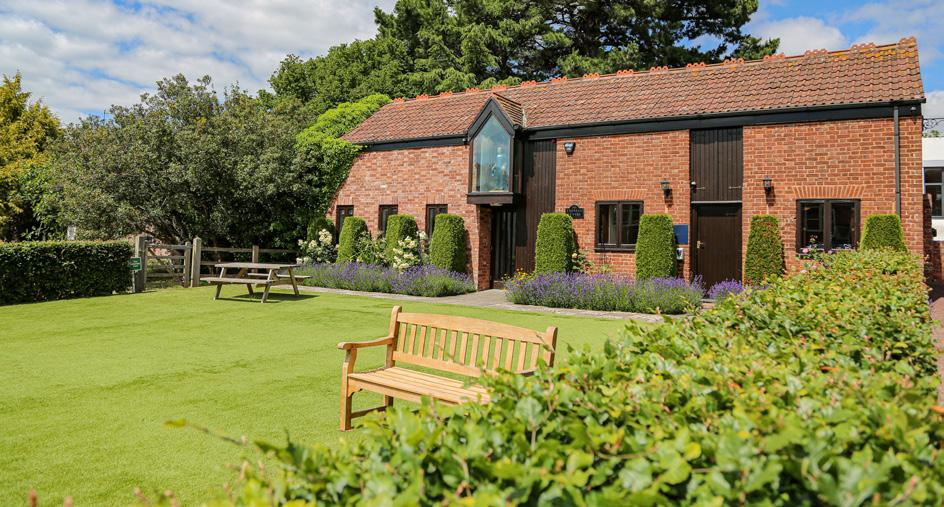
accessible. If you are ever in Exeter and would like to have a look please do contact the office – you would be most welcome to visit.
Thank you for your
support over the past year, and I hope you enjoy this issue of The 1633
Alice Holohan – Director of Development and Alumni Relations
Ed Hawkins MBE is Professor of climate science within the National Centre for Atmospheric Science and academic lead for public engagement in the Department of Meteorology at Reading University.
The Exeter School geography department describe him as ‘geography and climate change royalty’ and you will certainly have seen his work – his warming stripes feature everywhere from BBC News to Reading FC’s kit. The 1633 spoke to Ed about how he got to where he is today and learnt more about his warming stripes.
The 1633: Tell us about your time at school.
Ed Hawkins: I’ve always been a physicist at heart. At school I did maths, physics, chemistry and geography A Level, but came down much more strongly on the maths and physics side. I remember a number of teachers very fondly: Manoj Chitnavis, Pete Scott, John Davidson, and Helen Sail. I did a bit of cricket and enjoyed playing around with computers – computing at school really expanded during my time there. In hindsight, I think I probably worked a bit too hard!
T1: What were your next steps after school?
EH: I went on to study physics at Oxford and then did a PhD in astrophysics at Nottingham. When I finished my PhD I wasn’t sure what
I wanted to do next – I didn’t see myself being an academic at that point so went and worked for an IT company for a while.
T1: What was the reason behind that?
EH: I looked at my PhD supervisor and saw someone who was a brilliant researcher but who didn’t seem to be enjoying his life as an academic. And whilst I still love astrophysics I don’t think it’s necessarily the most practically useful science from society’s point of view.
T1: So how did you get into your current position?
EH: I didn’t enjoy working in IT in the end and decided to combine my interests in physics and geography and planned to apply to work for the Met Office, which had moved to Exeter by that point. I studied for a masters in maths and meteorology at Reading with the aim of transferring my skills into this new field, but ended up really enjoying being back in a university again. So, I got a research position at Reading and have been there ever since!
T1: What kept you at Reading?
EH: Reading, for historical reasons, is actually the university with the largest weather and climate research

centre in the country. The Met Office was based nearby in Bracknell before moving to Exeter, and the European Met Office is still here. The city has always been this amazing hub for weather and climate research. It’s a fantastic, collaborative environment to undertake research in.
T1: You moved into this field to have a more positive impact on the world – where did you find the impetus to make that decision?
EH: That’s a good question and I’ve often wondered where that spark came from – I’m still not entirely
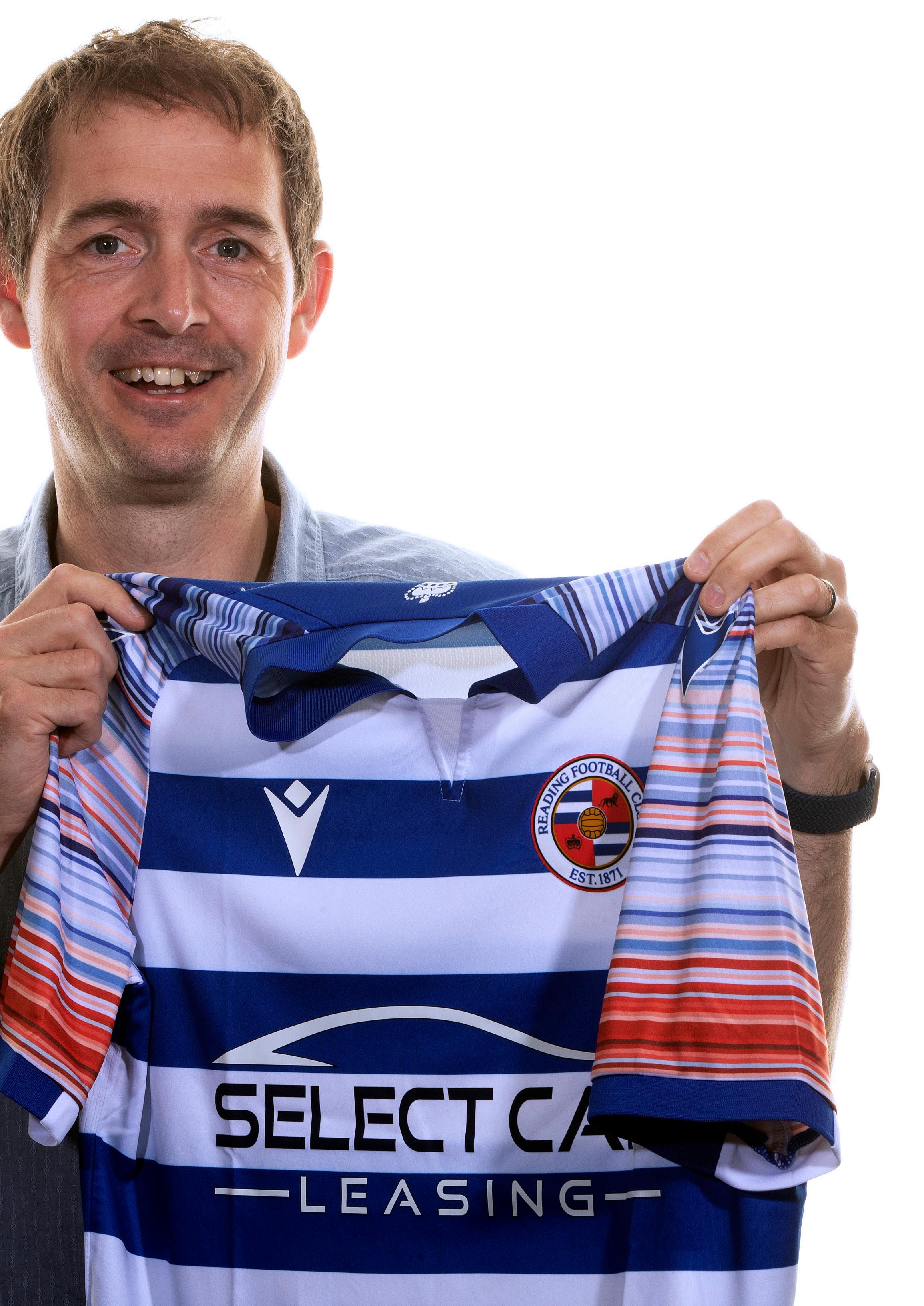
sure. Climate science as a discipline has a direct impact on the world and I know I wanted to be able to help people. And in 2003, around the time I was making these decisions, we had an enormous heatwave which killed around 30,000 people across Europe. It’s not something that’s talked about much now, but it probably had an impact on me at the time.
T1: What lessons do you think our pupils can learn from your career path?
EH: You shouldn’t be frightened of
changing direction. Your interests at 16 or 18 don’t have to dictate your whole life. I’m still really passionate about astrophysics but I’ve been able to pursue a career that I find meaningful in a different field.
T1: How would you sum up your research today?
EH: At the moment my main interest lies in trying to understand the changes we’ve seen to our weather and climate, and what this means for us now and in the future. Society is going to need to adapt to a changed climate, and make adjustments to achieve a ‘net-zero’ world. Climate science is playing a critical role in guiding these choices.
T1: You are not (for want of a better word!) ‘just’ an academic – another aspect of your role is as a science communicator. How do these different parts of your role work together?
EH: I don’t really see them as separate parts of my role. In climate science academics have to get out there and talk about their research because it’s so important that the public understands what’s going on. I talk to journalists, go to schools, am active on social media and, in short, use whatever platform I can to get the message out there. 20 years ago I think it was frowned upon to be an academic and talk to the media, but it’s certainly something that we are all encouraged to do today.
T1: Tell us more about climate spiral and warming stripes. How did these come about?
EH: I’m quite a visual person and enjoy looking at graphics rather than words. Today, when you can only guarantee holding someone’s attention for a few seconds on social media, clarity of communication is really important. I’d been blogging for a while and had made various different graphics showing how temperatures have changed across the planet. David Shukman, Chief Science Correspondent at the BBC, asked me to make a graphic that he could use in his coverage of COP15 in Paris. So I created an image in which lots of lines were stacked on
top of each other, showing a rise in temperature charted chronologically. I put the image on my blog and a colleague in Norway, whom I’d never actually met, got in touch to suggest that I join January and December together to present the data as a circle. I thought it sounded an interesting idea so put it together one Friday afternoon and posted it on my blog – and it went viral. There’s something really compelling about watching the animation which struck a chord with so many people [link to the spiral at the end of this article]. One of the more surreal moments was seeing it used in the opening ceremony for the 2016 Rio Olympics!
T1: How did you go from spiral to stripes?
EH: Firstly, I think it’s important to say that there are lots of us in this community who are experimenting with different ways of representing changes in climate because we all recognise the power of animations and graphics to spark conversations and change people’s thoughts and behaviours.
In 2018 I was invited to an event at the Hay Festival, which has a predominantly artistic rather than scientific audience. I was wondering about what I could show them that was easy to understand, visually compelling and felt relevant. I was inspired by a striped blanket that my colleague, Ellie Highwood, had made. I remembered discussing what information a blanket, or stripes, could convey and this led to creating a visual where each stripe represents the average temperature for a single year, relative to the average temperature over the period as a whole. Blue stripes indicate coolerthan-average years and red hotterthan-average. I put together the data for the globe but also for the town of Hay itself.
The response to it was great. I realised that using Hay specifically turned this global phenomenon into a very real and relatable proposition for the audience, who were able to grasp the simple, visual message very easily. We can clearly see the changes in climate wherever we live.


T1: Can you put together warming stripes for any town or city in the UK?
EH: We’ve got pretty good records for most locations going back to the 1880s, and some sites have records from the 1700s. Some of the longest are in Oxford and Durham, but Exeter actually has some very long records as well. The Royal Devon and Exeter Institute on Cathedral Green made measurements from 1812 to the 1970s – we’ve scanned all the original documents but haven’t converted them into digital data yet. Part of my research is working out how we can use these invaluable archives and the data they hold to improve our historical understanding of climate. There’s probably a lot of information out there sitting on shelves in dusty log books!
T1: What are some of the most exciting and impactful places that you have seen the climate stripes?
EH: The most exciting time was when I first saw someone else use them. A man in Minnesota decided



to paint his Tesla with the stripes. He took the car to various car shows in the state and he said he had more climate-related conversations in one afternoon at a show than he’d had in the rest of the year put together. Because people had approached him, after being intrigued by his car, it opened up a space for them to listen to him in a way that I don’t think they would have done had he tried to talk about climate change in a

different way – it certainly wasn’t a lecture.
And the stripes have been used in incredible places. The rock band Enter Shikari printed the stripes and had them as their stage background on tour – it was brilliant when they came to Reading Festival! They’ve also been in fashion shows, on the Reading FC kit, on the cover of Greta Thunberg’s book… the list goes on.
T1: What does the future look like for our climate?
EH: All scientists in my field are extremely worried about the future. It’s why I engage and why I get involved in the policy making and international processes that impact politicians who ultimately dictate the future of our climate. And it’s incredibly frustrating when actions do not match up to the promises made by politicians. Especially because I think most of the solutions actually already exist – we need our politicians to be brave, stop thinking about the short term and take the steps that climate scientists are advising. Many of these changes will also improve our lives, such as an improvement in air quality by switching to electric cars.
T1: Your work takes you to climate summits such as COP meetings –could you tell us a little bit about your work influencing policy decisions?
EH: I’ve attended two COPs to talk about what the science says about the risks we face and given evidence in parliamentary enquiries. Every country in the world accepts that burning fossil fuels is warming the planet, but they disagree about what to do about it. I think we are now at the stage where tackling the causes of climate change is a geopolitical problem rather than a scientific problem.
T1: What would you say to Exeter School pupils today?
EH: Start with talking to friends and family about the choices we are going to need to make, and the choices you are already making. These might be difficult decisions about how you live your day-to-day life, but these choices can be really rewarding. And also, when you can, vote!
Climate spiral:
https://www.climate-lab-book ac.uk/spirals/ Warming stripes: http://www.ShowYourStripes.info
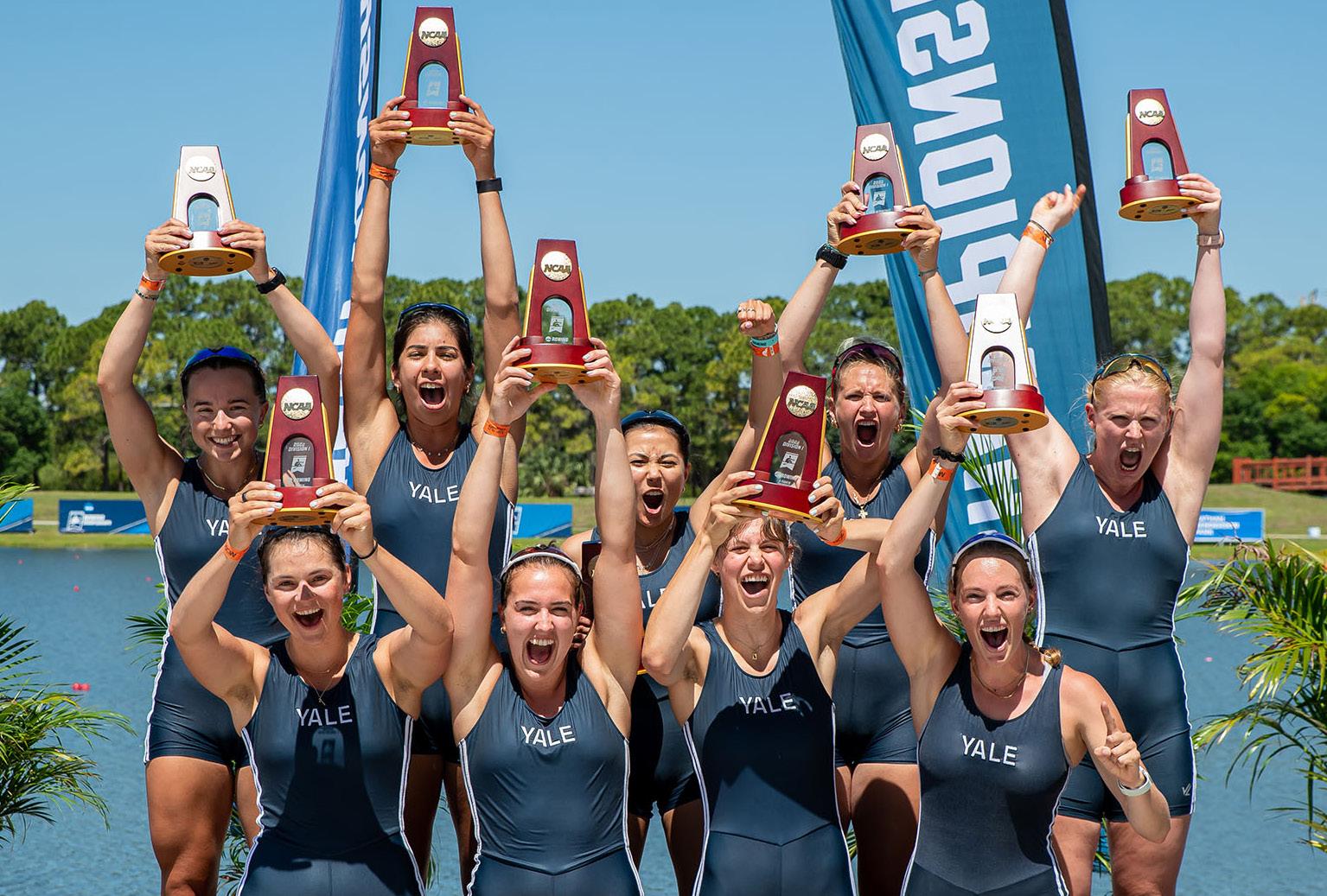
Exonians have ended up all over the world after their time at Exeter School. We caught up with three alumni who have spent considerable time in the USA.

After leaving Exeter School in 1973 Peter did a ‘thick’ (1-3-1) sandwich course in mechanical engineering with Vauxhall Motors and Imperial College. He then moved to Esso Engineering (Europe) Ltd, which resulted in a two year assignment to Exxon Research and Engineering in New Jersey, where he met his wife. After the assignment they came back to the UK for 12 years; initially at
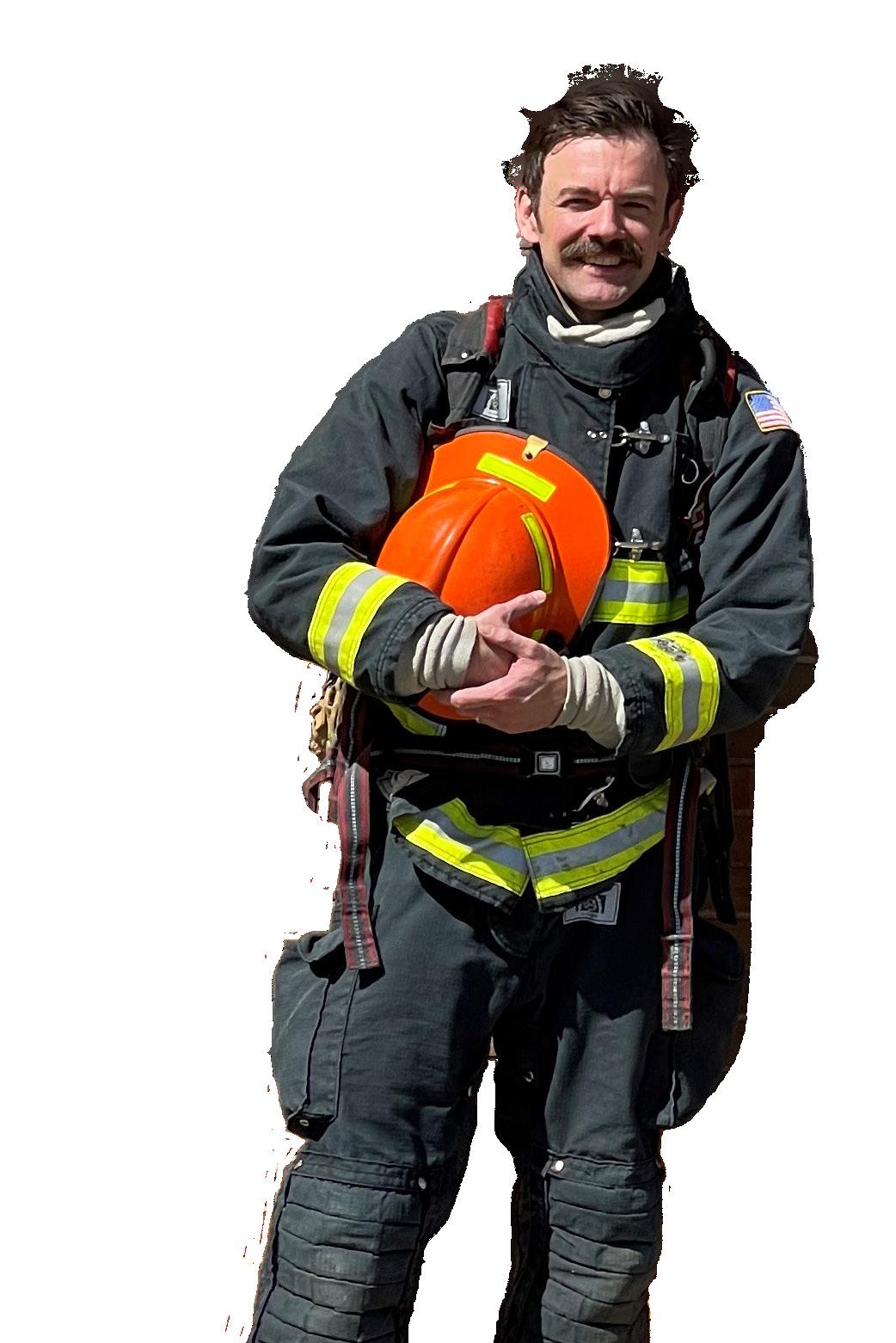
Esso, then moving up to Newcastle with Courtaulds Coatings where Peter moved into a manufacturing management role making powder coatings, which is a thermoset plastics extrusion process. His next career move was driven by family factors and took Peter to Kansas, still making powder coatings, then a move to Columbus Ohio; initially in powder coatings, then in thermoplastics compounding. A bad motorcycle accident left Peter partially paralysed from a spinal cord injury so he went into expense reduction consulting for 10 years.
“Now I devote my time to the spinal cord injury (SCI) community, working with the Christopher and Dana Reeve Foundation and Unite to Fight Paralysis, and I am currently co-chair of the Ohio committee directing state funding for SCI research.”

Peter is the school’s British Schools and Universities Foundation representative, which enables alumni based in the US to make tax-efficient gifts to the school.
Phoebe joined Exeter School in the lower fifth, after relocating from Sydney. It was in Australia that she had learned to row and after coming to the UK she joined Exeter Rowing Club. Soon her true potential was realised and she began training with the Exeter University squad, aiming for national teams. She credits the school with supporting her immensely during this time - “I was able to train at school which was fantastic, although I was probably in rowing gear more often than I should have been!” Phoebe was very passionate about her academic work, citing all her A Level teachers (she read French, English literature and Latin) as huge inspirations, and Mrs [Jo] Murrin as an incredible support as her head of house.
Phoebe made the national team and soon recruiting scouts from US universities came knocking. “I was offered incredible scholarships to state universities, really mind-
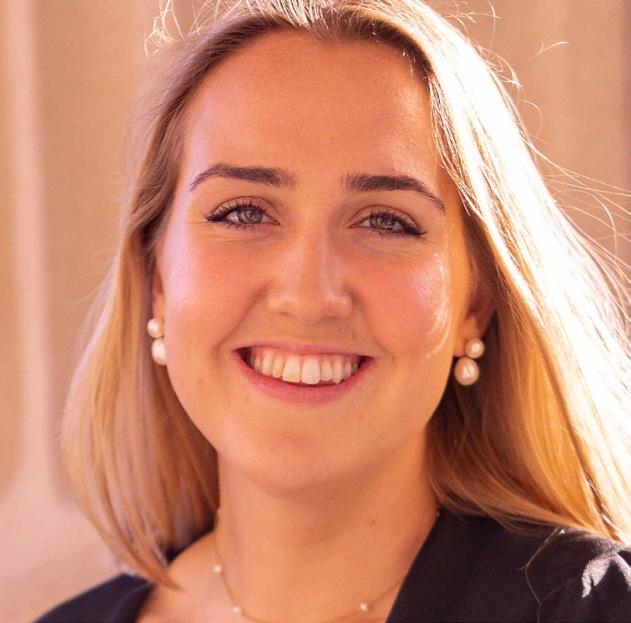
boggling amounts of money, but my academic work was incredibly important to me so I decided to aim for Yale.”
Phoebe had a transformative time at Yale. Her rowing took up 30 hours a week but she still made the most of the US academic system, using the opportunities to take different classes and discovering a passion for history of art. “I ended up double majoring in French and history of art, but also had the opportunity to discover so many other academic disciplines - I took courses on the criminal mind, microeconomics, bioethics and learned German from scratch.”
“My time at Yale was topped off by winning the national championships, a memory I won’t forget. Since coming back to the UK after my degree I also won a silver medal in the U23 world championships.”
Phoebe is now living in London and is training to be a solicitor with Freshfields Bruckhaus Deringer.
“After school I went to university (war studies at Kings, London) and then Sandhurst, Army (Rifles Regiment) for five years including deployments to Bosnia, Iraq, Afghanistan, Kenya, Norway, and The Falklands. I volunteered at Shelterbox (great way to gain experience of the charity sector) then started working for international NGOs and I’m still doing that 10 years later. (Some advice - if I mayis to take any and all opportunities
because you never know where they might take you, and take some timegap years, career breaks, sabbaticalsto figure out where your passions and skills lie. Nobody with an interesting story got there without some twists and turns!)
“My wife is American and after seven years in London we crossed The Pond - we met on the beach where we currently live. Today I’m the Director of Global Security at an INGO called Jhpiego - it’s part of Johns Hopkins University. We have 4000+ staff in over 40 countries, so it keeps me on my toes.
“It’s true what Churchill said, ‘Two nations separated by a common language.’ ‘America’ often gets a bad press (and Americans never call it America - it’s always ‘The States’ or ‘The US’), but Americans are friendly and welcoming, and there’s a spirit of support if you’re looking for a job or starting a new venture. The geography is amazing and vast. I visited Arches National Park in Utah years after studying it during GCSE geography – thanks Mr Hunt! I miss pubs and a decent cup of tea (I still buy tea bags when I’m over in the UK).
“I’m also a volunteer in the East Hampton fire department. There are a lot of volunteer fire departments in the US - particularly in rural communities - and I decided early on that I would sign up. I’m technically on call 24/7 and carry a pager that alerts me to a call. Whoever is available then drives straight to the fire (we have our own blue lights and carry our ‘turnout gear’ - as our firefighting uniform is known - in our cars), where the trucks meet us and we put out the fire. I go to about one or two calls a week and it’s great to be part of a high-pressure team again after my time in the army, and certainly adds a bit of excitement in what otherwise might be a boring day (or night).”
To find out more about how to support the school from the USA please visit https://www.bsuf.org/ or contact Alice Holohan on asah@exeterschool.org.uk
Last year The 1633 spoke to Ten Tors manager and maths teacher Mr Ben Hall about Ten Tors at the school today. We were delighted that Mr Jon Lewis OBE (1954-1962) got in touch to tell us more about the first time Exeter School ever competed in the challenge.
So spake the General; and a roar of Trumpets struck the listless air, and with a Cadence tremulous resounded and re-echoed
All the length of that sad plain; and hardly
Had they finished but the masses rose,
And like unto an army in retreat disordered
Wended their several ways across the heath
Innumerable. Rescending fast into
A mighty gorge that roared with torrents fierce
And ghastly wails, the Heroes soon outpaced Their peers, the many sojourners of Dartmoor.
Pursuing, in a noble sweat, their sorry course, It chanced that through an error cartographical, Their footsteps erred, and roamed into
The gloomy Southern climes, unto the very Bounds of utmost Avonhead, and when from Thence th’ unhappy band were by an aged rider Redirected, the sun, as if by hostile human hands
And not by machinations inviolable
Propelled, had overrun by half its course diurnal.
Poem written by Jon and published in the Summer 1961 edition of The Exonian. To see Jon’s full account please contact the Alumni and Development office for access to our online archive.
The 1633: Tell us about Ten Tors in 1961.
Jon Lewis: The first ever Ten Tors challenge was in 1960, and Exeter School started participating in the competition’s second year, entering two teams in 1961. It was a CCF initiative back then, and we had to complete the walk in uniform. In 1961 there were two possible routes, 35 and 50 miles, with both Exeter
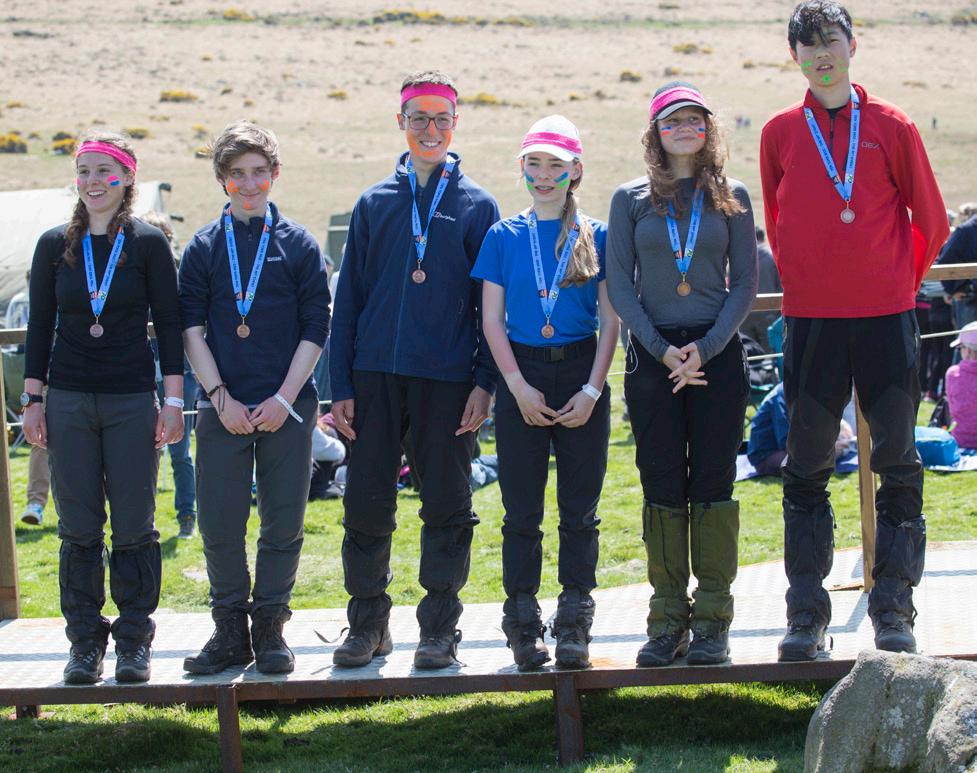
Ten Tors tie [Jon is wearing his tie in the photograph accompanying this article]. Unfortunately, the other Exeter School team finished outside the time.
T1: How did you prepare?
Covid]
School teams opting for the 50 mile route. We had 36 hours to visit all ten tors, starting at 6am on Hay Tor. The start of the competition was very dramatic – I remember a lot of trumpets.
My team decided to go south and the other Exeter School team headed north. We finished with 35 minutes to spare; I was given a small medallion and was eligible to buy a
JL: Because it was only the second year of the competition we didn’t really know what we were letting ourselves in for. We did a couple of practice walks on Dartmoor, but in fact our training in the CCF and on arduous training had prepared us very well for the challenge. Map reading was absolutely essential but we had been taught how to use a prismatic compass well.
On a practical level, I used the best boots I could find and also soaked my feet in salt water for half an hour each night to prevent
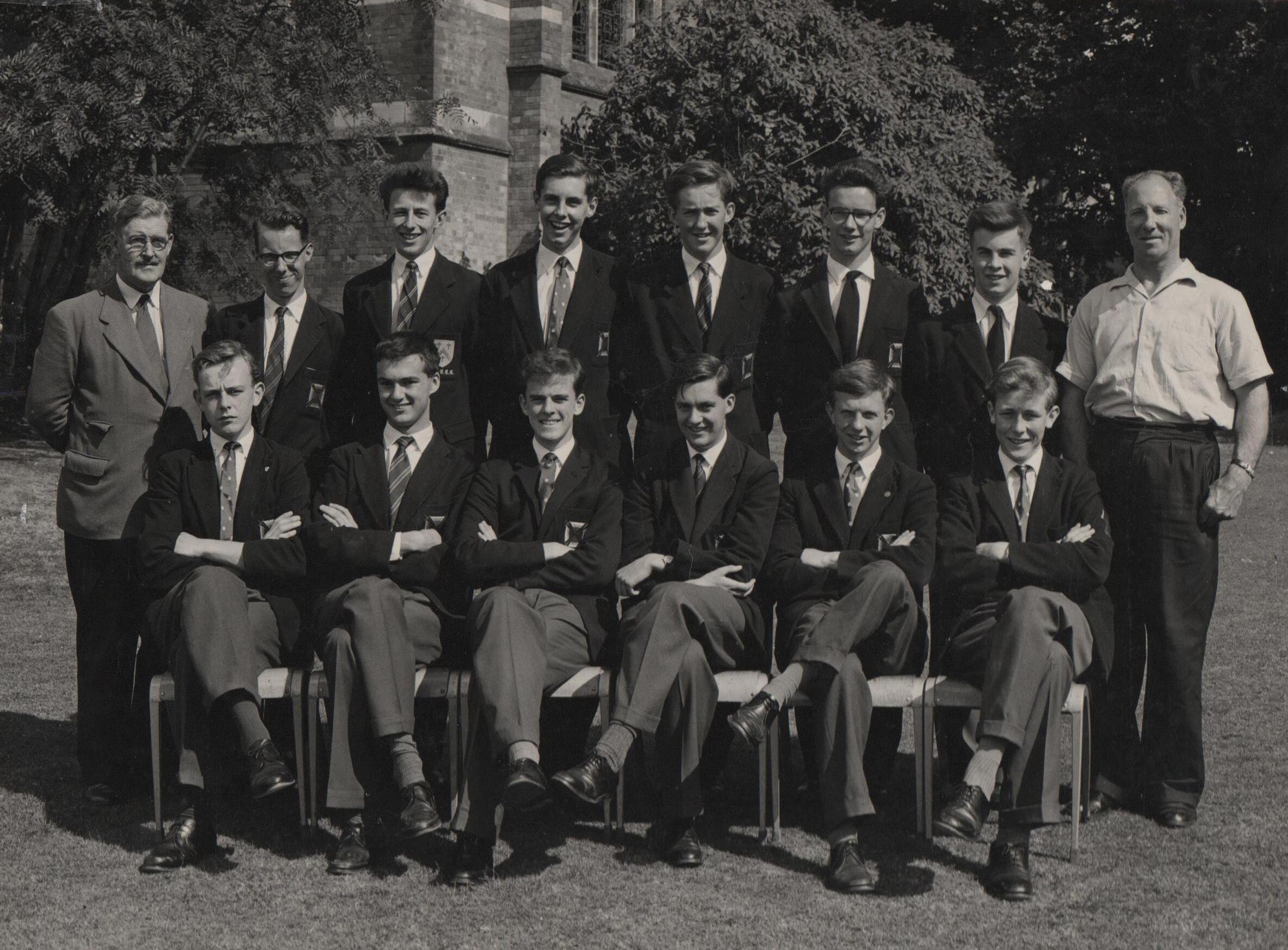
blisters, which I swear by. In fact, I have a good anecdote about blisters. Prior to the event the team questioned teammate David Seward’s (1953-1961) fitness, and took him to play basketball in the gym – as a result of which he got blisters before we even started! Inevitably they got worse, and he finished the walk in gym shoes with his boots tied around his neck.
T1: You wrote a fantastic (and unflinching) account of the expedition for The Exonian, featuring bogs, bandages and blisters. What do you remember of the walk itself?
JL: We got rather lost on the south moor, despite our map reading skills. There was a certain area around Great Mis Tor that you had to reach
in order to set up camp for the night. We only just made it and had to really speed up to make the time the next day. We had a great sense of achievement – 50 miles on that terrain is pretty difficult! But I have only pleasant memories and would do it all again tomorrow if I could.
T1: What did you learn from the competition?
JL: In many ways it was an extension of the sort of things we learnt in the CCF – team management, camaraderie, map-reading. It has also given me a life-long love of walking. I lived in Italy for many years and my wife and I got to know the Apennines very well. In 2011 to mark the 50th anniversary Dave Seward and I planned to do a few commemorative tors with our wives,
but it rained by the bucketful all day, and we had to call it off. Good thing it wasn’t raining like that 50 years ago. Any possible 60th anniversary walk was ruled out by Covid.
T1: And what would you say to Exeter School pupils who are tackling, or thinking of tackling, the Ten Tors challenge?
JL: If pupils are considering whether or not to take on the challenge I can only encourage them. It was a once-in-a-lifetime experience and I will always remember it. And if they have decided to take part I would say make sure you can read a map really well, get in some training and look after your feet – there’s nothing worse than foot problems when you’re walking over rough terrain.
How do school trips enhance learning? The 1633 asked members of staff to tell us why they believe getting out of the classroom can provide an invaluable learning experience.

School trips are an essential part of learning; providing opportunity to inspire pupils with activities and events in the ‘real world’. School can often feel like a ‘bubble’, so it is incredibly valuable to get out and about into the wider world and see much of what they have been learning about in practice – modelling practical application of
skills and ideas. It is also motivating for pupils to get out of the classroom – to experience new environments and to hear new voices and ideas.
James Brough – Head of DramaI believe school trips greatly enhance learning for a number of reasons. Firstly, it can help pupils to see the relevance of

what they have learnt about in the classroom. Seeing things in ‘real life’ helps to consolidate learning and makes facts more memorable. Trips also provide a fantastic opportunity for pupils to learn collectively, and inspires conversations between pupils about what they have experienced. Finally, I think pupils learn best when they are having fun, and our hope for all trips is that they will be exciting and enjoyable for pupils alongside being educationally beneficial.
Bethan Rose – Assistant Head (Character)Having the opportunity for pupils, and staff, to go on school trips is invaluable, learning doesn’t just happen in the classroom, it happens on the water, in the art gallery, and walking across the moors. Pupils and staff come back with an increased level of intrigue and understanding, having been given the opportunity to ask, listen and explore what is going on in the outside world.
Emma Taylor – Art TechnicianWhat are your thoughts on the future of trips in classrooms and education more broadly? Let us know.
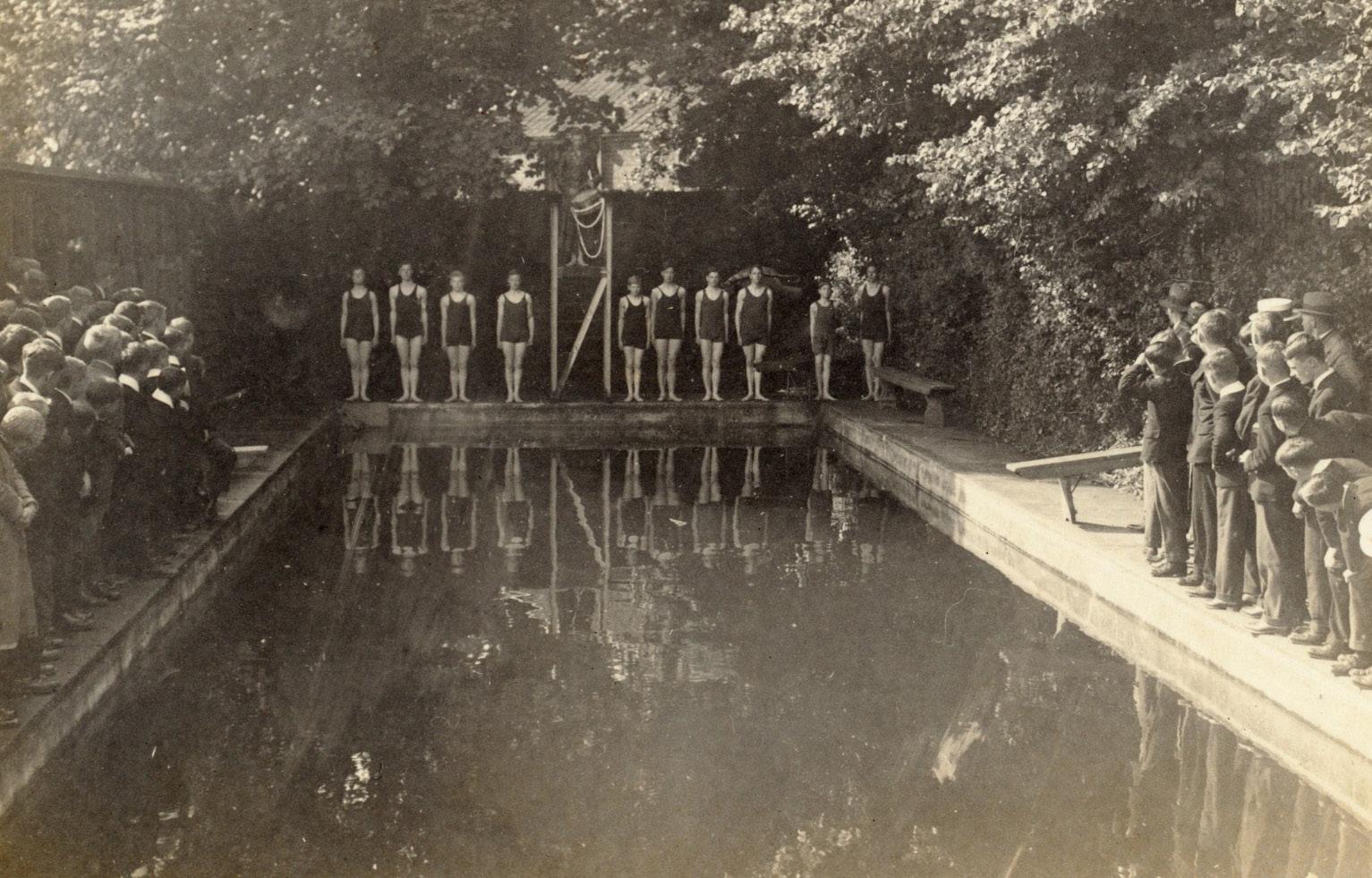
This academic year we have opened a new reception building, which provides a warmer welcome to the school site for visitors
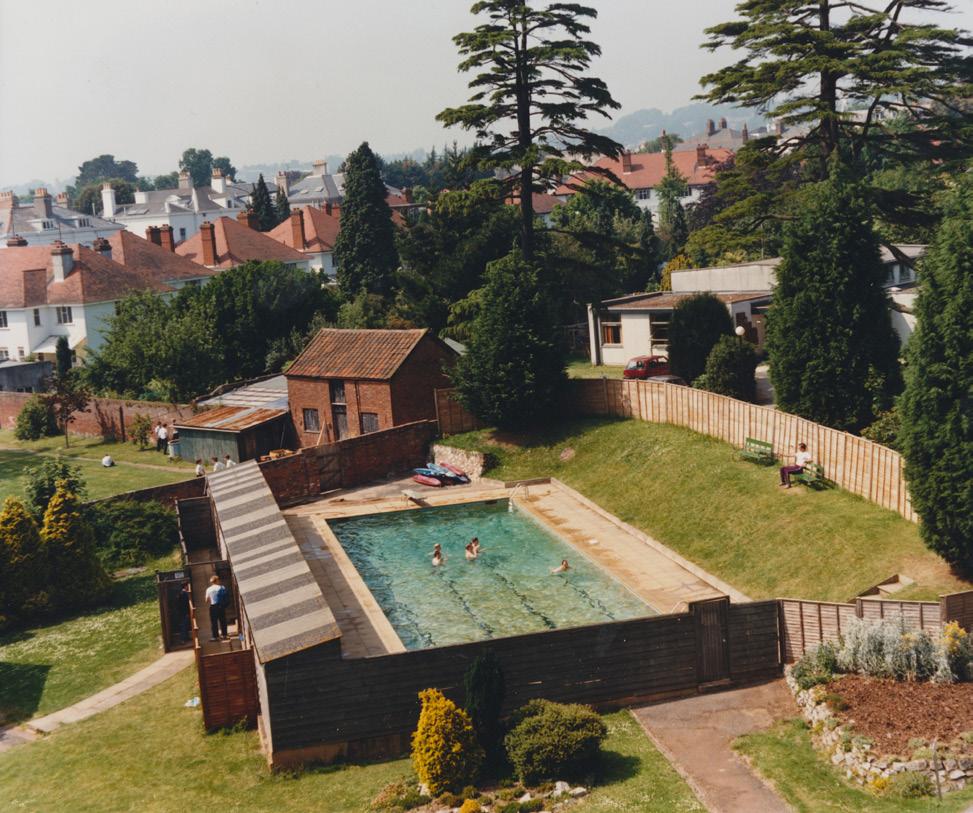
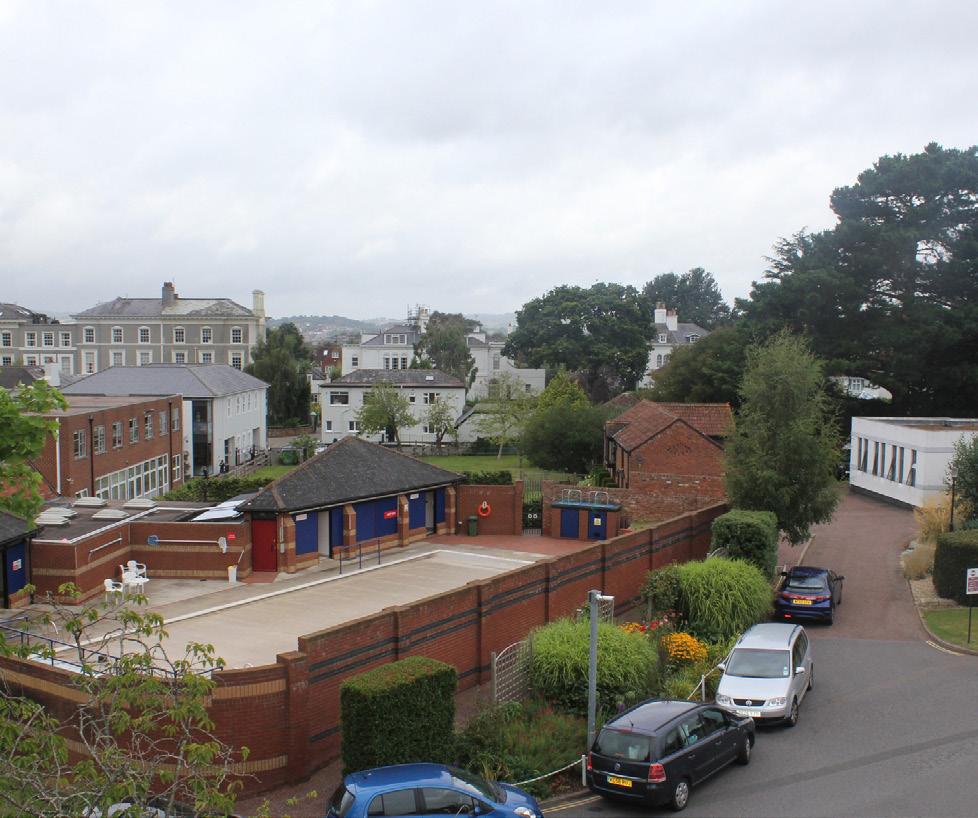


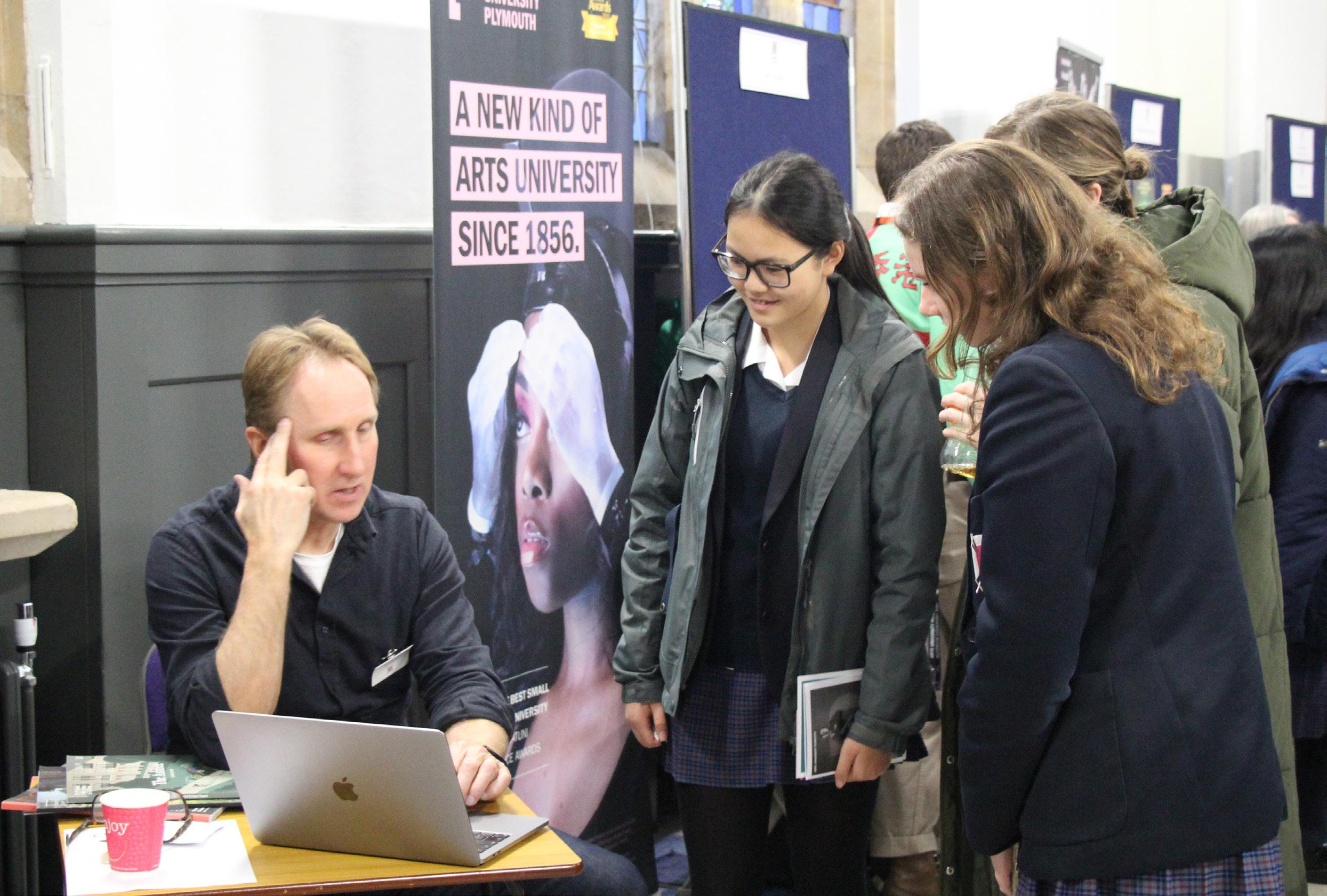
This academic year saw Exeter School’s inaugural Creative Careers Convention. From marketing, copywriting and journalism, to art, theatre and singing, every pupil had an opportunity to explore the many creative career paths available to them. The 1633 is delighted to share the thoughts of three of our alumni who generously gave up their time to share their expertise with our pupils.
“Immediately after leaving Exeter School, I secured a work experience opportunity with Orbex, an aerospace company which is currently developing a small commercial orbital rocket. Following this, I took a gap year and travelled around the world before being called back because of Covid. During Covid, I was offered a position with Martello Expert Services, a start-up company offering expert witnesses in the financial services and energy disputes sectors.
I am currently the Marketing Manager for Martello Expert Services. As we are a start-up company, my day-to-day role is extremely broad, and focuses on anything from creating and executing campaigns of thought leadership written by our experts, to analysing the capacity planning for our team. When I started back in early 2021, I was hired as an operations analyst, where I focused on setting up and implementing different procedures throughout the
team. This also included working with various different high-tech software – therefore allowed me to gain a broader view of the companies’ practices, and each area a start-up has to focus on to be at the centre of our clients’ minds. In order to keep learning at a high-level view what the key driving factors are of a start-up company, the Marketing Manager role is the best place for me to do this, whilst taking responsibility for a department.
Being in classes taught by Mr Bell and Mr Mackintosh really solidified the message to me that although school is a short-term thing in anyone’s life, it is up to you to take as much or as little as you want from it. The current CEO of my company has given me a passion to one day be in his place. I would love to be the one of the key driving figures in a start-up company and use the knowledge I have acquired to take different opportunities that come my way.”
(1975-1982)
“Way back when I was at Exeter School, creativity was largely defined by what you produced in the art room. Typically taking the form of a rather misshapen pot, a questionable sculpture, or a painting that at least somewhat resembled the bowl of fruit that was its inspiration.
Those whose ideas, ambitions and outlook didn’t match the range of options found either within the pages of a Ladybird Book, or on offer at the annual careers convention, were likely left pondering whether or not they were misfits that would struggle to find their place in the adult world of work.
But thankfully forty years on, everything has changed, and in an age where automation and digitisation have driven a new world order, by association the value placed on our unique human ability for original thought and creativity has risen accordingly. So worry no more, those who historically may have struggled to find the right bottom rung to their own careers ladder.
In which context, I was delighted that Exeter School created a new careers event, specifically dedicated to inspiring young minds to consider a career centred on creativity and invention.
So here’s to the next creative generation, I can’t wait to see how the ideas they’ll have and things they’ll do, will play a part in all of our futures.”
“I started at Exeter School in 1980 and left with 3 levels in 1987. Rather than go to university as the majority of my peers did, I opted instead to start work at Midland Bank in Exeter, alongside Greg Evans (19761987), where we were both accepted on their management development programme.
At that time there were plenty of opportunities for career progression and I ended up enjoying a 25 year career with Midland (later to become HSBC), working in both retail and commercial banking across the south west. My final post was as a regional global payment solutions manager, where I was one of the first staff members to be based from home, way before developments in technology made this a feasible option for many positions. Following the global banking crash of 2008 and several ‘operational re-structurings’ however, HSBC continually looked
to rationalise staffing numbers and I was eventually made redundant.
This gave me the opportunity to try something completely different and I spent five years working for the local charity Hospiscare. This was very rewarding (and also great fun!) and it was there I started proofreading some of the communications that were sent out to supporters, on the basis that I had a good eye for detail. I found this really enjoyable and to help me do it properly I undertook a few proofreading and editing training courses. Eventually I realised that I could make a living by doing this on a freelance basis, which is what I now do.
I edit anything from website content and financial accounts to promotional materials, leaflets and advertisements. As well as checking punctuation, spelling and grammar, I also ensure the content is both clear and consistent – a fresh pair of eyes can almost always improve a piece of writing!
My clients initially came from businesses I had dealt with in my previous careers, and I am now in the fortunate position of having satisfied customers recommend my services. Being freelance gives me a great deal of flexibility and helps greatly with my work/life balance. I can choose what work to accept and when to undertake it. It might not be for everyone but I am very glad I took the plunge and started editing when I did.”


Exeter School owes its existence to gifts left in Wills and they continue to transform the education provided to bright pupils in Exeter today. Our founding mission stated that our teachers should not “…refuse nor neglecte to teach [pupils] in respect they are poore, or will or cannot give rewards…”. Today, an Exeter School education should be accessible to bright pupils from the local area, irrespective of their financial background. Legacies provide vital support for this aim.
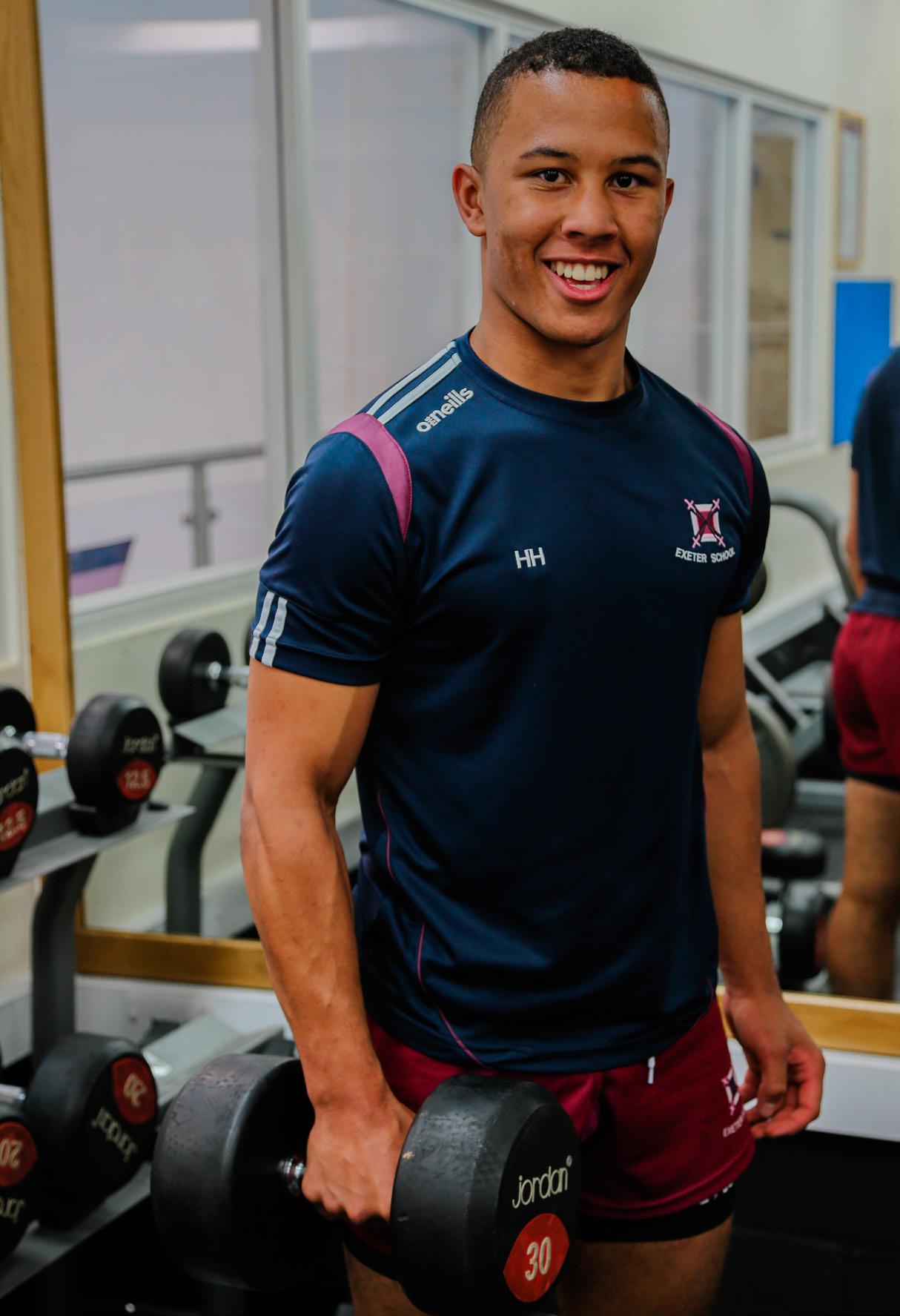
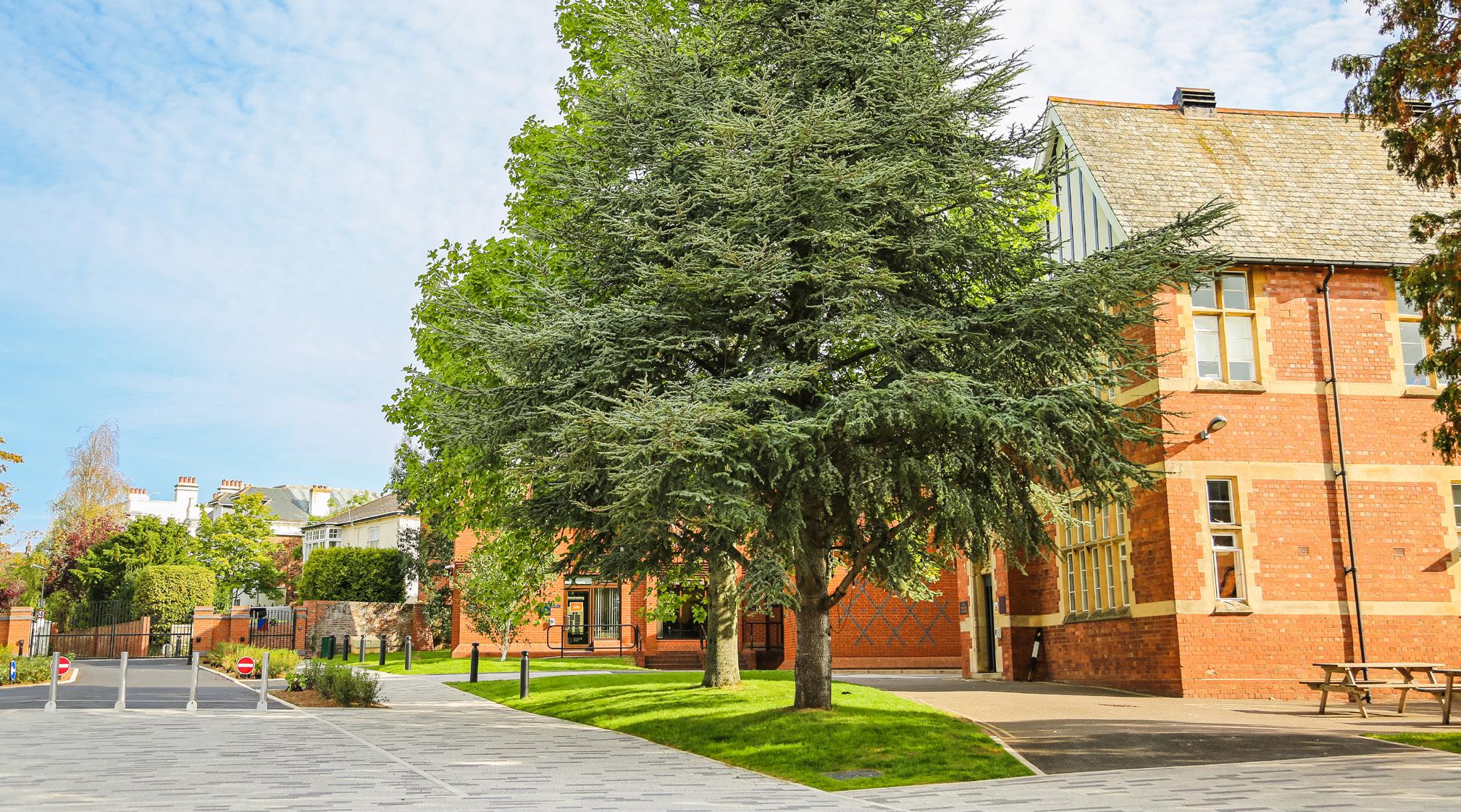
The opportunity to attend Exeter School should not be left to chance. Every bright child who has the potential to thrive here should be given the opportunity to do so
Exeter School offers an exceptional education. We are proud of our outstanding academic results and the range of co-curricular opportunities we provide. The development of our pupils’ character is a priority for the school.
The opportunity to attend Exeter School should not be left to chance. Every bright child who has the potential to thrive here should be given the opportunity to do so, for the benefit not only of themselves and their families but also the school community and our
wider community. A bursary, which is means-tested financial support awarded to a child who has secured a place at the school, enables a pupil who would otherwise not be able to attend the school to gain an Exeter School education.
We have ambitious long term aims to increase our bursary provision, growing our bursray fund and using the income it generates to provide bursary places in perpetuity.
Every year there are children who qualify for a place at Exeter School but are unable to join us owing to financial constraints. We want to be able to provide more free places to
pupils in and around Exeter – we can only do this with donations and legacies.
Your legacy gift, whatever the size, will help change lives.
Did you know that Exeter School is a charity? Our registered charity number is 1093080. You could therefore save £400 out of every £1,000 you give to the school as a legacy.
You can leave any sum to the school – even 1%, so your family inherit the majority of your estate.
You must take financial advice.
If you would like to make a transformative education a possibility for motivated and talented pupils with disadvantaged backgrounds then please contact Alice Holohan, Director of Development and Alumni Relations, for further discussion.
Photographs are for illustrative purposes only. Pupils shown are not necessarily bursary recipients.
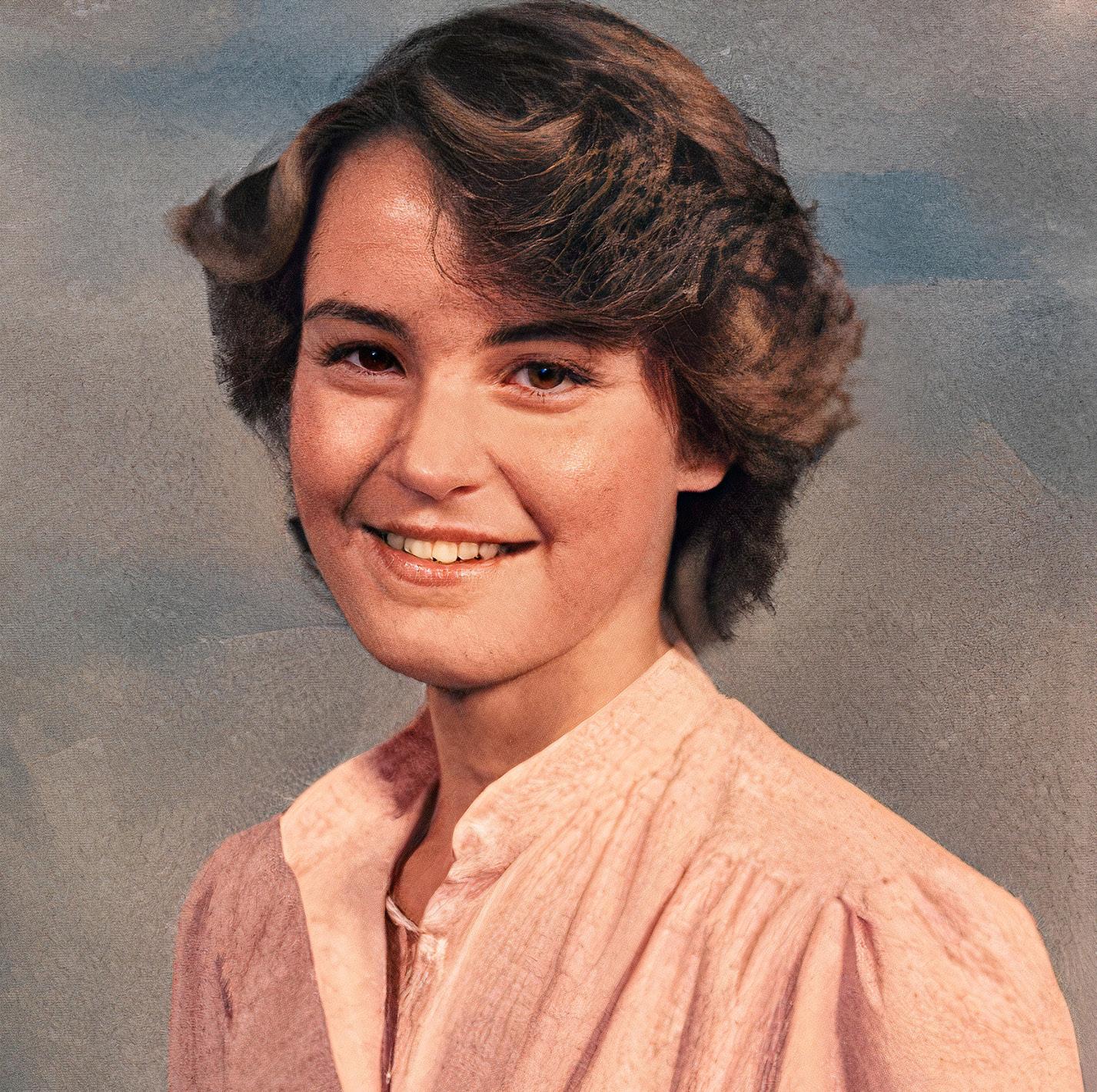

Gillian Hodgetts (1984-1986) is an alumna of St Margaret’s School and studied in the sixth form at Exeter School. She is Director of Communications, Marketing and Engagement for the South Central Ambulance Service NHS Foundation Trust, and advises the school on communications and health issues. She has been a governor since 2011 and is currently Vice Chair of Governors.
The 1633: Can you tell us a little about the relationship between Exeter School and St Margaret’s when you were here?
Gillian Hodgetts: We were a distinctly different organisation from the boys in the big and mysterious building down the road. So much so that the St Margaret’s windows which looked out over Victoria Park Road were papered two-thirds of the way up so we couldn’t see the Exeter School boys! But it was incredibly exciting to have the opportunity to study here. You would be amazed at the number of St Margaret’s girls who aspired to join the Exeter orchestra despite not being able to play an instrument, and how many boys took home economics classes at St Margaret’s…
I took A Level economics at Exeter and so would spend the majority of my school day at St Margaret’s before going down for my economics classes. I found those lessons somewhat challenging – there was one other girl from St Margaret’s in my class and we were rather a novelty. We spent most of the first half term fighting off the notes that were written to us and thrown across the classroom. But eventually that settled down and what emerged was a brilliant learning environment; economics became my best subject and I am still grateful to Mr [Roger] Walker for his teaching!
The Exeter School teachers welcomed us and treated us with a great deal of respect. John Davidson was a teacher when I was in the sixth form and when I became a Governor some 25 years later and chaired the Foundation Committee of which John was a key part, he asked me to call him John. My response, ‘I’m not sure I can, you’ll always be Mr Davidson to me!’
And it wasn’t just inside the classroom that we got involved – the relationship between the schools opened up new opportunities for doing lots of things together, such as music and drama. I played in two of the orchestras and the opportunity to take part in a co-ed ensemble was brilliant. And I made incredible friends at Exeter – one is godfather to one of my daughters.
T1: Tell us what school life was like in the mid-1980s.
GH: Exeter School was a very different school in the mid-eighties – obviously there were no girls, we still had boarders, and the facilities were nowhere near what pupils enjoy today. But it was a very sound, safe school and whilst a lot has changed it has still held on to that ethos, I’m pleased to say.
T1: What is your fondest memory of school?
GH: Apart from being proposed to outside the school gates in front of my mother, it was the extracurricular activities – the music and drama. We had fantastic teachers and a wonderful team working on costumes, hair, make up – it was so exciting for us to be creative and be on that stage. Two particular productions really stand out – Fame and Guys and Dolls. We had such fun, and when I hear the music to Fame it all comes flooding back!
T1: What’s the most significant change to the school since your own time as a pupil?
GH: The facilities have improved dramatically – the music department is fantastic and pupils are incredibly lucky to have such a brilliant swimming pool.
But obviously the greatest change
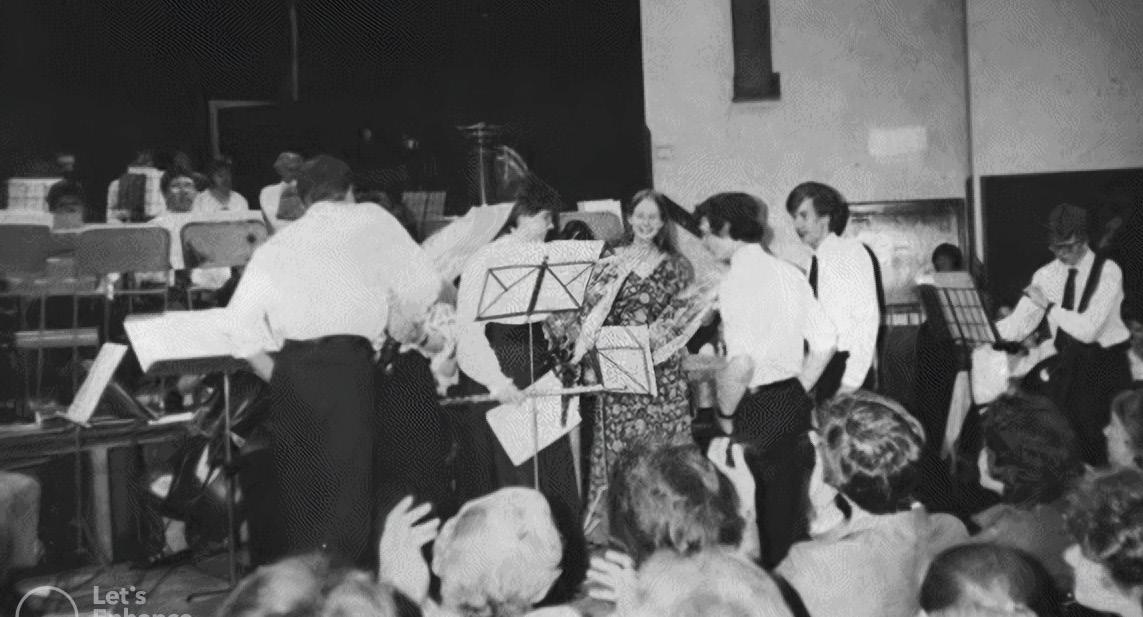
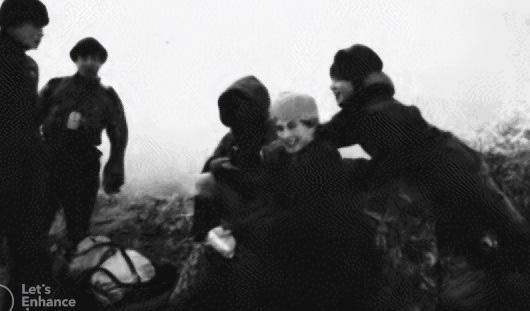
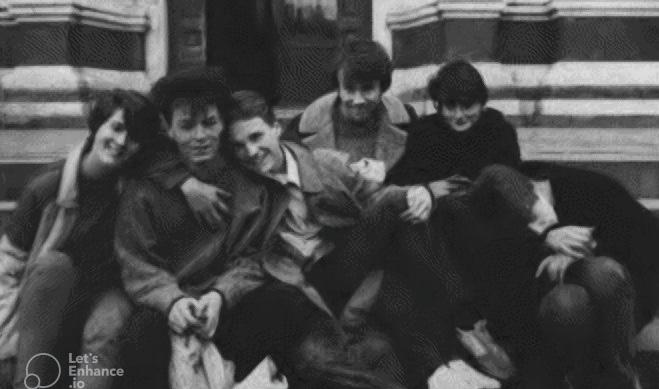
is that we are now co-ed, and I would say we feel like a naturally co-ed school. Often you can go into schools and it feels like a boys school that has started to take girls, but if you walk into Exeter School today
‘there was one other girl from St Margaret’s in my class and we were rather a novelty. We spent most of the first half term fighting off the notes that were written to us and thrown across the classroom. But eventually that settled down and what emerged was a brilliant learning environment.’
you certainly don’t feel that. And it’s fantastic that we now have a female Head. Louise Simpson is a brilliant role model and her appointment is a sign that the school is progressive and looking to be diverse and reflective of the world we all work in.
T1: Any final reflections?
GH: I absolutely loved Exeter School and, I promise I’m not just saying this, I think it added a huge deal to my education. I was really lucky to have been one of the very first girls to have this opportunity at Exeter and it’s why I want to give back to the school. If I can do anything to support and help the school, to keep it developing, then I’m really happy to do that.
The 1st XV rugby pitch alongside the lower drive. The name came from Rugby School which still retains its ‘big side’ pitch.
The language we use in school has changed over the years. Our archivist, Kevin White (1954-1961) has gathered together some of the words which have dropped out of use at school today.
Stodge – Thick pudding with a layer of jam underneath frogs spawn/fish eyes – Tapioca
The train boys came from Exmouth, Tiverton, Teignmouth and Dawlish. Boys were ‘bussed’ from Sidmouth, Cullompton, Broadclyst, Pinhoe, Kennford.
Each house shared a cap room. Goff and Raleigh Houses shared theirs on a lower level near the shower block. They were also changing rooms for P.E. and games.
For School House boarders who were taken ill. As soon as the new RD&E Hospital was built alongside Barrack Road, it became a music room where Ivan Cole taught music and classics. At one time it was the residence of Miss Coleclough, Headmistress of the Prep School.
The school sold off part of the playing field to the Nuffield in two stages.
CCF on a Monday for cadets who fell foul of uniform rules and military defaults from the previous Friday’s parade and training.
The colts pitch to the east of the main pitch.
Mainly adopted by School House prefects who made boys (usually Third Formers) do menial tasks around the dorms.
Now an astroturf pitch, often used for playing hockey.
The small hut adjacent to the fives court. It was manned by Mrs Holl at morning break times and after games in the afternoon. Messrs Brice, Clarry, Brooks, Leger and Reg Edworthy were often regular staff members at the counter taking afternoon tea. ½ d buns sold for 1d (penny).
The lost property alcove underneath the staircase and administered by prefects who charged 1d or 2d per item according to its value.
One event/institution which has been consigned to history is this exam which was held in November of one year, and January/ February the next. It was very divisive and stressful and successful pupils on the second attempt were awarded a City or County Scholarship. This enabled ‘scholars’ to choose a school of their choice (or their parents did). Such schools in the Exeter catchment area were Hele’s Grammar, The Maynard, Bishop Blackall (all girls), Q.E.S. Crediton and Exeter. This system ceased in 1971.
One material advantage was that ‘scholars’ received free bus and train season tickets to be used in term time only.
Kevin estimates that over a third of the pupils at Exeter School during the 1950s were scholars, and therefore

Thank you to Bruce Stoneman (1953-1960) for setting this crossword.
Across
9. Driver’s short cut, often involving residential streets and typically used to avoid rush-hour traffic (3,3)
10. Across and 3. Down If you are caught here you are in a difficult situation where a choice must be made between two equally unpleasant courses of action; amidst the devil and the deep blue sea (7,1,4,3,1,4,5)
11. Any bone of the foot between the ankle and the toes (10)
12. Preliminary version of a device or vehicle from which subsequent forms are developed; the first example of something; mock-up (9)
13. Across and 41. Down Swiss patriot in the early 14th century who was renowned for his skill as a 16 across and is remembered for shooting an apple from his son’s head with a crossbow (7,4)
15. Waste material; junkyard metal (5)
16. Sign of Sagittarius; toxophilite (6)
19. Watched something; looked at, attentively; inspected (6)
20. Lionel Bart’s 1960 musical, an
adaptation of a famous Charles Dickens work, featuring songs like ‘Food, Glorious Food’ and ‘Consider Yourself’ (6)
24. The largest city and former capital of Turkey; Constantinople, today (8)
25. An illustrated book containing details of items for sale (9)
26. Look over a piece of writing to check for errors, such as spelling mistakes and grammar problems, before publication (9)
27. The highest point of something, especially fame or success; towering, pointed summit of a mountain; peak (8)
29. Eyeball someone in an unpleasant way, that shows you are carnally interested in them; look lasciviously; ogle (4,2)
31. A diacritical mark placed over a vowel in German (ö) to indicate a change in sound (6)
32. Research dissertation; candidate’s essay for a university degree (6)
35. Lip lustre or shiny paint (5)
36. Wallet worn at the front of the kilt as part of men’s traditional Scottish highland dress (7)
38. Neil --------- , American astronaut who became the first man to walk on the moon (9)
40. Southernmost continent (10)
42. In a way that was not expected; suddenly, from nowhere; without warning (3,2,3,4)
43. Away from the sea; not coastal (6)
1. Sudden rise in illegal acts in an area; spate of law-breaking (5,4)
2. Song which is a melody for a solo voice with an instrumental accompaniment, that is often performed in an opera (4)
3. See 10. Across
4. Deposit of calcium carbonate resembling an icicle, handing from the roof of a cave (10)
5. Something kept or given to be kept as a memento; small object of sentimental value (8)
6. Motivating chant that’s uttered over and over, to aid concentration in meditation; statement or slogan that is recited, such as during prayer; Sanskrit word for “sacred utterance” (6)
7. Push one’s bottom lip forward to show petulant annoyance; disdainful grimace; look sullen/sulky (4)
8. Capital and largest city of the newlynamed North Macedonia (6)
10. Play music in a public place and solicit money for it (4)
14. Previous name of Tim Henman’s sport, when it was played on the grass in the gardens of the old British aristocracy (4,6)
17. The honorary or titular head of a university (10)
18. Mixed-breed dog; mutt; cur (7)
21. Soft Italian unsalted cheese, similar to but lighter than cottage cheese (7)
22. Stoical facial expression used to hide one’s disappointment; the ability to stay calm and not show one’s feelings in a difficult or upsetting situation (5,5,3)
23. An open four-sided courtyard with buildings around it, esp. in a school or college (4)
25. Coconut husk fibre, used to make door mats (4)
26. Food that is this has to be used quickly or it will decay, so that it cannot be eaten; biodegradable (10)
28. Principles of behaviour; rues of conduct; benchmarks/yardsticks (9)
30. Speeches at funeral services praising the deceased and summing up the person’s life, achievements and personality (8)
33. Farm implement used after ploughing for breaking up and smoothing out the surface of the soil, which shares it name with Winston’s Churchill’s alma mater (6)
34. Loose skin at the back on an animal’s neck; the place a mother cat picks up her kittens (6)
37. Inflammation of a sebaceous gland on the eyelid, usually cased by bacteria (4)
39. Badger’s burrow (4)
41. See 13. Across

Istarted my career as a pilot in Bournemouth in the autumn of 2016. After many exams for both my private pilot licence and more importantly my Airline Transport Licence, and building my flight hours, I was then able to gain my commercial licence along with a variety of other flight ratings so I could start applying for jobs. My first role was as a commercial first officer with Flybe based out of Belfast, where I completed short haul flights across Europe and the UK. After Flybe went into administration I moved into the private sector with a company called Naljets based in Newcastle, who I am still flying for today. This role is particularly interesting as half of my time is split completing charters for private clients, and the other helping the NHS deliver organs for transplantation to those in need across the UK.
In aviation there is no ‘typical’ day and you never really know if something will change last minute, whether it be a 2am or 9pm call out, it’s a 24 hour job. Before the actual flying takes place, my day starts by completing a variety of paperwork including calculating routes, performance, mass and balance for the aircraft, and checking the weather and fuelling, all to ensure the plane is prepared
for flight. Once the passengers arrive, we start the engines, run through all of our checks and then we are cleared for take off and ascend into the clouds. All being well we enjoy the views of flying along at 36,000ft and over 350mph. It’s then a quick turnaround once landed, and if we are lucky we grab a hot coffee before being back in the air with our next job. Normally a full day will involve between 2, 4 or 6 flights and can occasionally leave me somewhere exotic for one or two nights, before then returning back to base and the comfort of my own home. When I am not flying, you will otherwise find me participating in various sports from squash to road cycling.
It has been a real privilege to have had the opportunity to experience both the commercial and private aviation sectors so early on in my career and I feel very lucky my role is so varied and gives me the opportunity to see the world from such a unique perspective. Being in such a small team here at Naljets I have managed to experience things within the aviation sector that I may not have been able to elsewhere. After two years of hard work and enjoyment I was very humbled and privileged to have been offered the role of being a Captain within the company, something that you can only dream about
‘It has been a real privilege to have had the opportunity to experience both the commercial and private aviation sectors so early on in my career and I feel very lucky my role is so varied and gives me the opportunity to see the world from such a unique perspective.’
as an aspiring pilot and now I am living that dream. As part of this, I recently went to the flight simulator and had my captain’s check completed and now I’m in the process of completing all relevant training to have this milestone in my career signed off. I will never get bored of looking down over cities at night and seeing their lights illuminated below or the colour of the sky when the sun begins to rise or set!
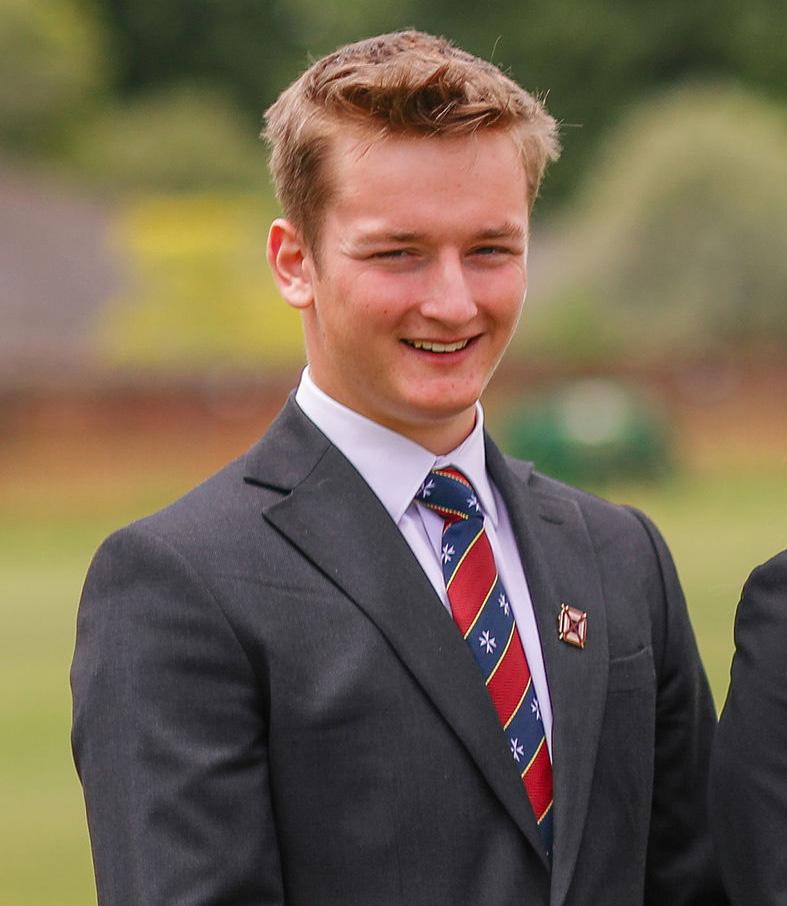
Toby Collins (2016-2023) has just left Exeter School. He was Deputy Head of School, our alumni prefect, a member of the rugby 1st XV and VII, hockey 2nd XI, and Able Cadet in the Navy section of the CCF.
My school day starts around 8am when I come into the common room and see my friends. Depending on the day of the week, I then head off to meet with my tutor group or attend a year group assembly. Often our year group assemblies focus on careers, helping us explore options for our future. On a Tuesday morning before school, the heads of school have a meeting with the Head Ms [Louise] Simpson to discuss upcoming duties and events.
After that we have three lesson periods. I’m studying maths, politics and history and also get free periods now I’m in the sixth form. I spend these getting work done
in the sixth form centre (or having my hair cut…). I’ve enjoyed my academic work more and more as I’ve gone up the school – in U6 you have a great rapport with your teachers and it really changes the experience of learning.
On Mondays we have a whole senior school assembly and as a Deputy Head of School I helped give out notices and deliver other readings. I really enjoyed the publicspeaking aspect of my role and got used to addressing the best part of 1,000 people every week.
I was very keen to be a prefect – I wanted to give something back to the school. It was a big commitment but I got a huge amount out of it. I had to be present at lots of school events, have regular meetings with the Head and Head of Sixth Form [Mr Luigi Chu] and led my peers in a number of activities. I’ve learnt a lot about leadership.
As well as being Deputy Head of School I was also alumni prefect. I work closely with Ms [Alice] Holohan on events involving pupils and alumni and also show alumni round school when they visit. A highlight for me was meeting Tim Creswick and showing him around last academic year [you can read an interview with Tim in the last edition of The 1633 ] – it was great to have an opportunity to meet a former Deputy Head Boy.
And then it’s time for break. On Tuesdays our Head of Sixth Form Mr Chu has a sixth form shout and lets us know any news at school that affects the sixth form.
After two more lesson periods it’s time for lunch. I try to get my scran down as quickly as possible because I usually have something on. I’m in the symphony and chamber orchestras, Jazz Band 1 and senior brass and often have meetings at lunchtime as well. Very occasionally I don’t have something on and get to spend time with friends in the common room or go to the gym.
Following lunch it’s back to the classroom or sixth form centre for three more lesson periods in the afternoon.
The school day technically ends at 3.55pm, but I’m usually here until at least 5pm. The training for the sports I play is intensive. In the autumn term we play rugby and I go to the gym with the team after school on Monday, have training on a Tuesday, more training on Wednesday (although this takes place in games in the afternoon), go on a team run after school on Thursday and then have a rest day on Friday before playing on Saturday. On Friday I have CCF after school, and sometimes we have rehearsals for upcoming concerts.
Once I’m home there’s homework to catch up on and then I’m usually finished just after 9pm.
Of course there’s lots that goes on at school outside the average day. A highlight from last academic year was the winning sports tour to Canada – we played five and won three matches, and saw a lot of Canada in between.
What’s important to me about Exeter School? Our history and character. I really like our traditions and core values. One of my favourite parts of the school is the archive in the Exonian Centre, but it’s also great that we have a contemporary feel alongside our history. Our character comes not just from our lovely old buildings but all the people here – I know everyone at school by face if not by name and feel very seen here. It’s a brilliant community.
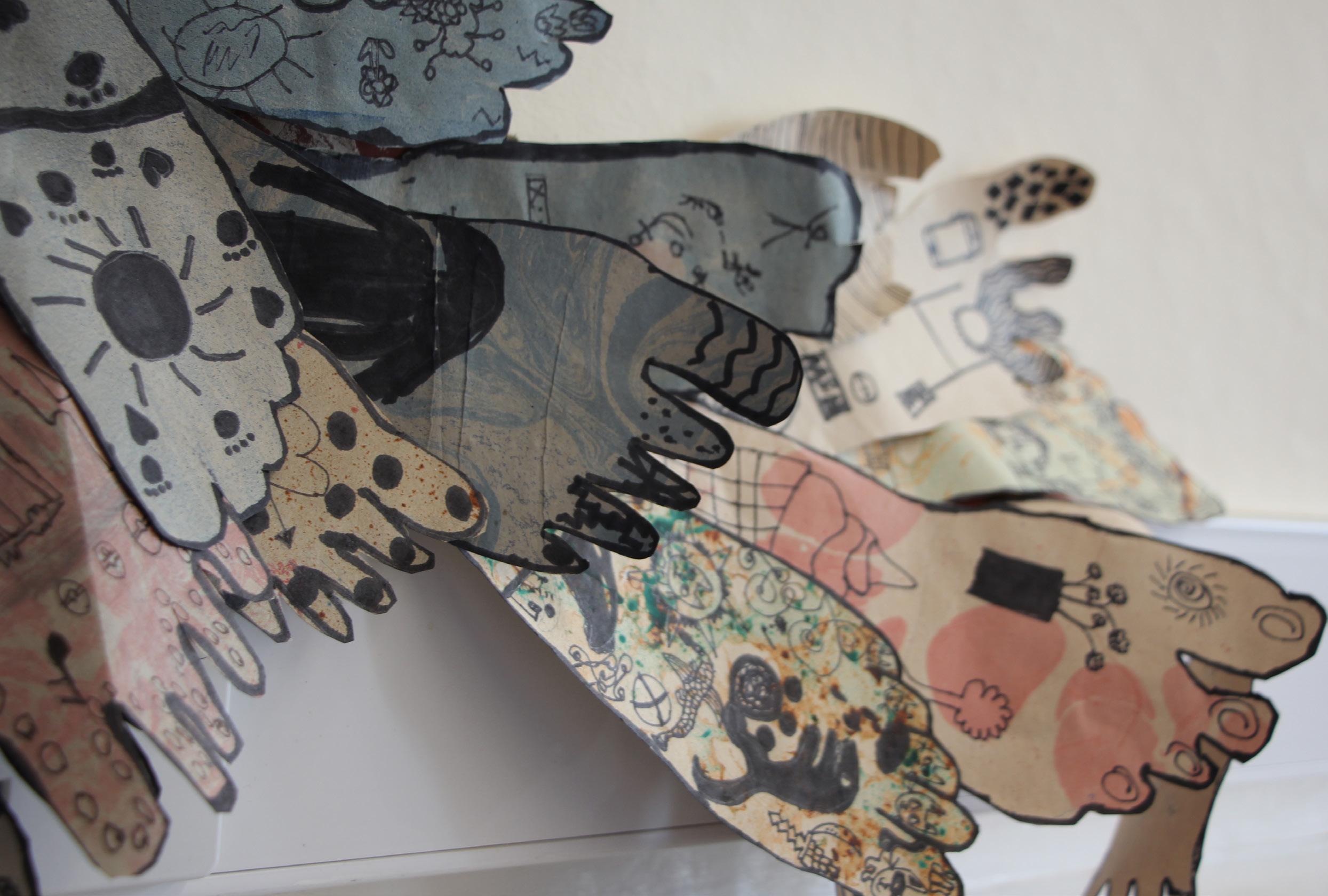

The welfare of our pupils is the school’s first priority; it’s at the heart of what we seek to do.
Martin Hughes, Senior Deputy Head and Designated Safeguarding Lead, shares an update here on the many ways in which we look after our pupils’ wellbeing at school today.
At Exeter School we have always prided ourselves on being a school that focuses on the whole child. We take pupils over the tors of Dartmoor, to play sport overseas and to the cathedral to make music. And we have always taken the time to get to know pupils (as well as their parents) and care for them through the ups and downs of teenage years. The Covid-19 pandemic proved incontrovertibly that schools do far more than give pupils a grounding in reading, writing and arithmetic; we provide crucial support for our pupils’ welfare and wellbeing. So, what does pastoral care look like at school today, and what changes would alumni see?
Things have certainly come a long way and they have needed to do so. There is a national debate about child mental health, particularly regarding the role of social media and mobile phones. The resulting 24-hour culture offers no downtime, provokes a fear of missing out and leads to endless comparisons within peer groups. The statistics are frightening but I will leave others to argue the exact cause and effect

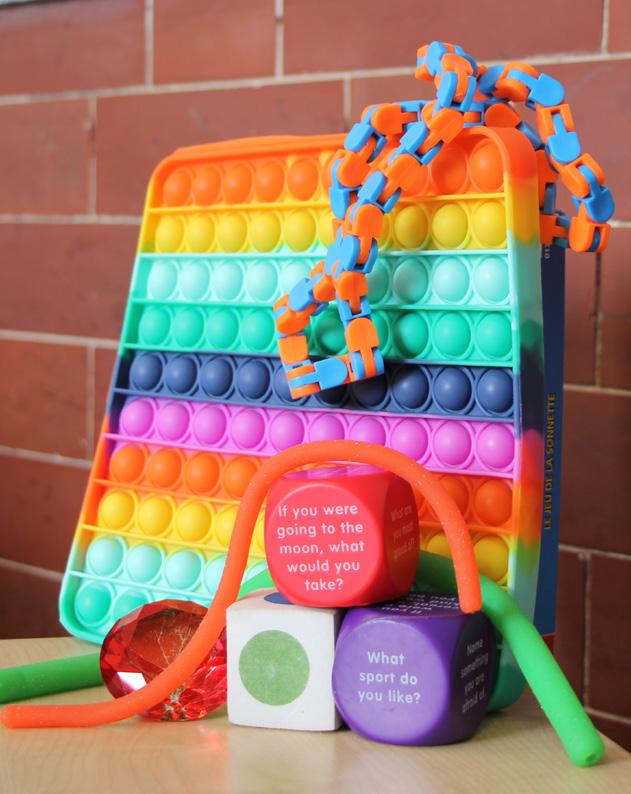
and simply say that we certainly see the cumulative effects on our young people. Pupils need increased support in order to navigate their school years and emerge prepared for the challenges beyond.
I am now lucky to be supported by a team of trained specialists who work alongside the teachers and house staff that you will remember. We could not do without our trained paediatric nurse, Lisa Barlass, who leads our health provision in school and is training as our senior mental health lead. Jess Doku, our head
of safeguarding, joined us from a career as a social worker within the local authority, most recently within Devon’s Multi-Agency Safeguarding Hub. Her detailed knowledge of other services which our pupils can access is invaluable and she is another caring voice who can have those important conversations with a child who is struggling. We are also increasingly aware that difficulties observed in a pupil might mean that parents are struggling in some way, and Jess’ experience and knowledge can help parents access the support services in their community. I am glad to say that it is now more acceptable on a societal level for adults and children to openly discuss their own mental health and related issues such as anxiety, low mood, disordered eating and self-harm. Assisting pupils and families with such challenges is now very much part of our school provision.
We now have a dedicated space in school for pupils who are struggling, have particular needs or just prefer a quiet space at breaktime or lunchtime. Room 3, an adapted classroom on lower corridor, offers pupils the chance to have a few minutes away from the hustle and
bustle of our busy school site. The room has sofas, blankets, sensory toys as well as games, and is staffed by another new colleague. Becky Glanville came to us from a career providing specialist support directly to children in care and adults who provide foster care. Her oversight of room 3 has made it one of the happiest rooms in the school, even though it is the place where children can go when they are at their lowest point. The role of room 3 and of Becky’s care has spread through the pupil community. It is lovely to see that our pupils not only know where to go when they need help, but also know that they will be listened to and cared for as soon as they cross the threshold.
The provision of learning support also feeds into this care. Diagnosis of neurodiversity is unrecognisable from that 20 years ago and we are actively working to help those with a diagnosis of, for example, autistic spectrum condition. We also educate our community about such differences. The 2022 edition of The Exonian has a fabulous article, ‘Autistic and Proud’, by Joanna who left school in 2022.
All of these experts support the house system of pastoral care which alumni will remember from their days at school. House staff are invaluable, and the individual relationships between teacher and pupil and teacher and parent are as important as ever in the provision of pastoral care. The pastoral structure at school is currently evolving in order to ensure that it stays fit for purpose in an ever changing, ever more demanding environment. The houses provide excellent ‘vertical’ strands of care, with house staff staying with pupils throughout their time at school. We are in the process of adding ‘horizontal’ threads (focussing on year groups) to our pastoral structure in order to provide an even tighter web of support for our pupils.
Pastoral care is at the heart of what we seek to do. Happy children are children that learn and thrive at school and in life. The aims have not changed but the practice will continue to do so.
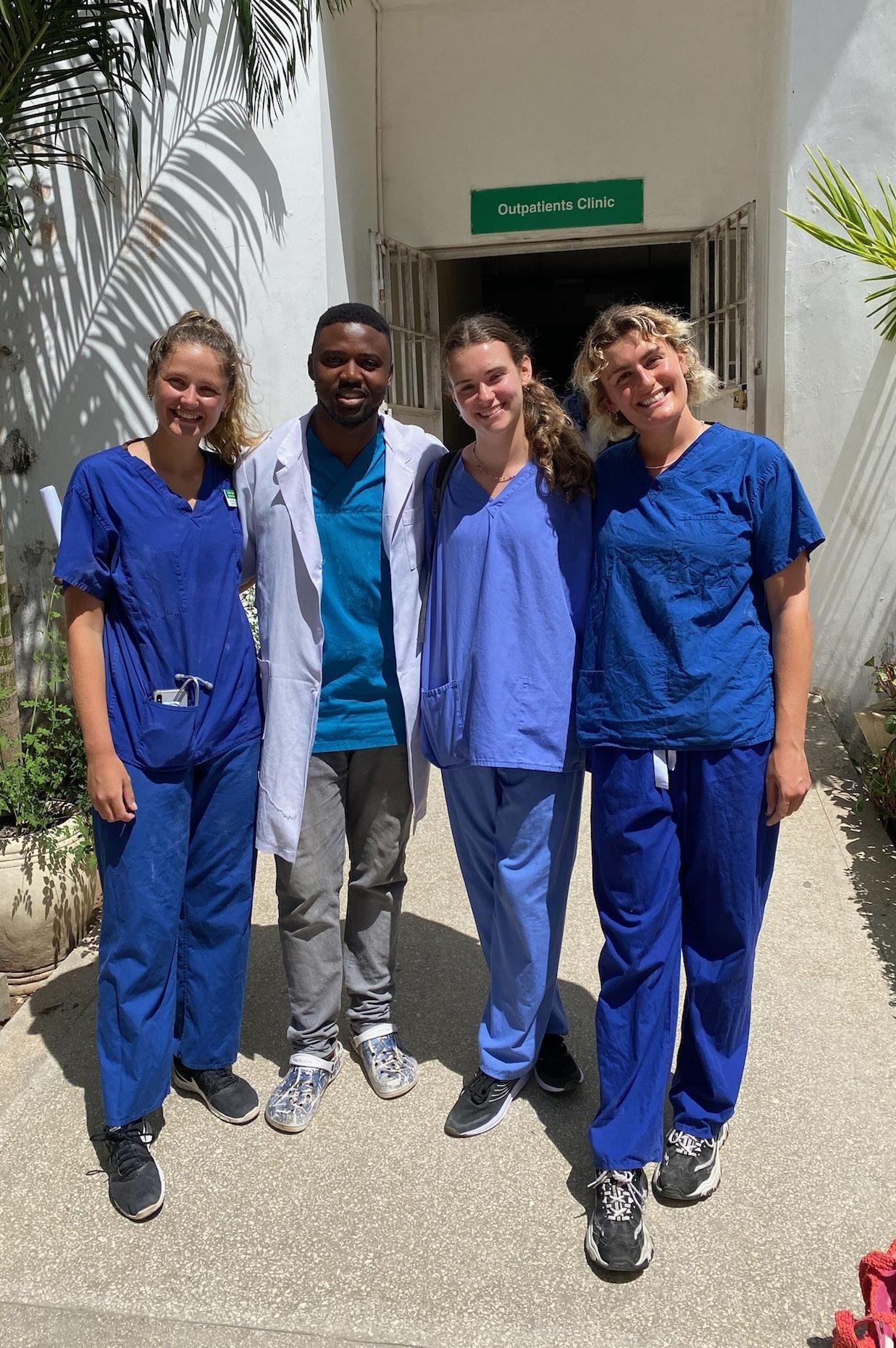
OE Grants of up to £250 are available to Exonains to support projects you are involved in which help others in local, national or international communities. The 1633 heard from two Exonians who have used OE Grants to support their medical electives.
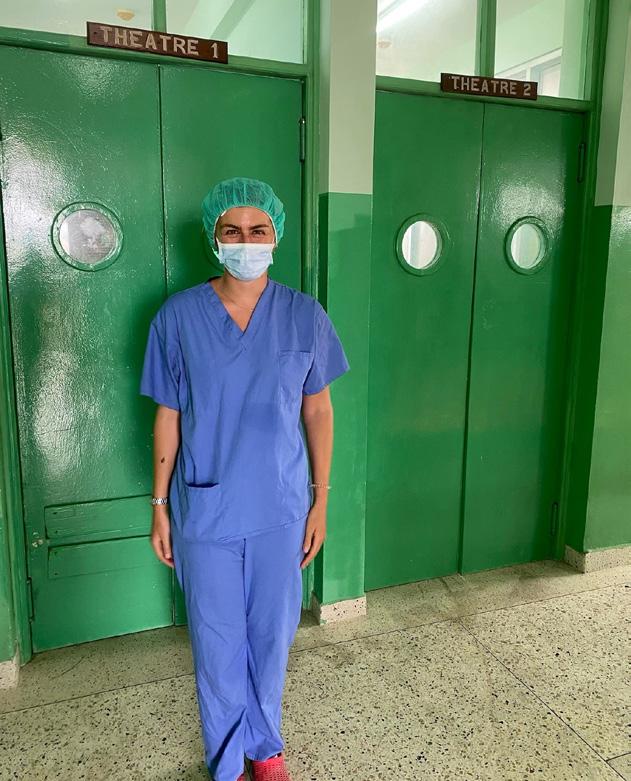
For my medical elective I was fortunate enough to be able to visit the beautiful island of Zanzibar, just off the coast of Tanzania. With two friends, I spent a month in the biggest government funded hospital on the island, Mnazi Mmoja.
Despite its glamorous tourist scene, Zanzibar remains short of basic resources and this, coupled with an incredibly high birth rate (especially twins!), has resulted in frequent overcrowding.
When we arrived in the maternity department, we were amazed to see three expectant mothers sharing each bed. As one mother began to actively deliver the other two would obligingly stand up to give her more space. The wards also housed cats who launched themselves through the windows onto unsuspecting mothers to escape from the heat.
We soon learnt that epidurals and Entonox were non-existent during labour, and were in awe of the tenacious mothers as we assisted with deliveries. After birth it is traditional for the newborns to be wrapped in colourful swathes of cloth known as kangas. Unbeknownst to us these different kangas were associated with different Swahili superstitions, and we often found ourselves rummaging through boxes for the perfect kanga to wrap them in.
Whilst there was much joy in maternity there were also times
when we felt incredibly helpless. As there is almost no ante-natal care on the island, many babies were born prematurely needing high dependency care that simply could not be provided. As a result, the neonatal mortality rate in Zanzibar is ten times that of the UK. Despite this difficulty, all the staff worked tirelessly and allowed us to be part of their brilliant team, experiencing so much in just a few weeks. They were upbeat and ingeniously resourceful with the equipment they had - who knew a rubber glove had so many uses!
To round off a wonderful trip we travelled up through mainland Tanzania into Kenya for a safari before flying home to start our final year.
I am extremely grateful to Exeter School for enabling me to have this experience. If anyone would like to know more about the hospital or my trip, please ask the Alumni and Development office to put us in touch.
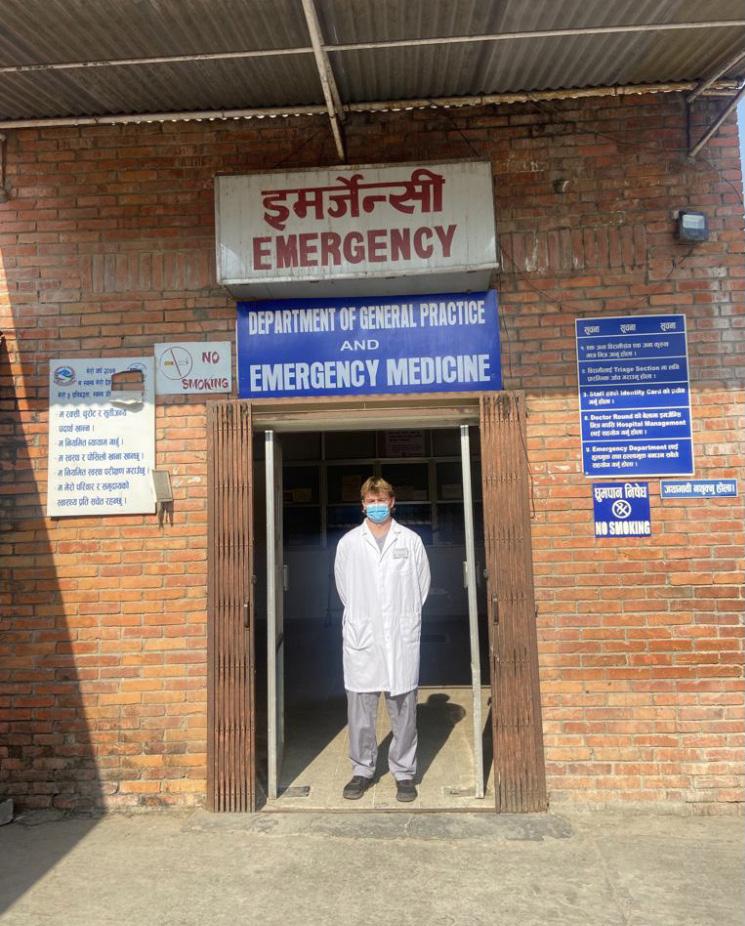
In the final year of medical school at Cardiff University you get the opportunity to do an elective for eight weeks working in a hospital abroad. I did my elective in Patan hospital, Kathmandu, Nepal. I spent the first half of the elective in the emergency department. This involved taking
histories and examining patients as well as ward rounds in the morning and afternoon. I saw a wide variety of patients ranging from those with burns and lacerations to more common ailments seen in the UK like heart attacks, diabetes and lung problems. In the second half of the elective, I spent my time between the orthopaedics outpatients’ department (OPD) and operating theatres. In the OPD I shadowed the junior doctors and assisted in taking histories and clinical examinations of patients. In the operating theatres I watched a variety of surgeries. This placement allowed me to gain knowledge in these two specialities. Also, the money from the cost of the elective went directly to a charity called Doctors for Nepal. This charity helps fund students from rural Nepal to go to medical school. After completing their studies, they return to these rural areas for two years and provide key medical care there. After the placement we also did a 10-day trek in the Nar Phu valley which borders Tibet. After medical school
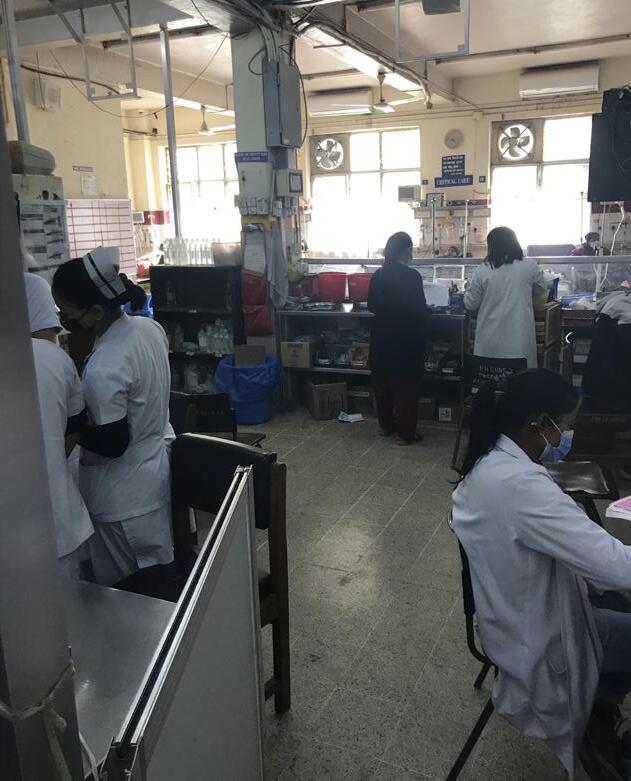
I will work in Derriford hospital in Plymouth for two years then join the Army as a doctor in 2025. You can find details of how to apply for an OE Grant on the school website.
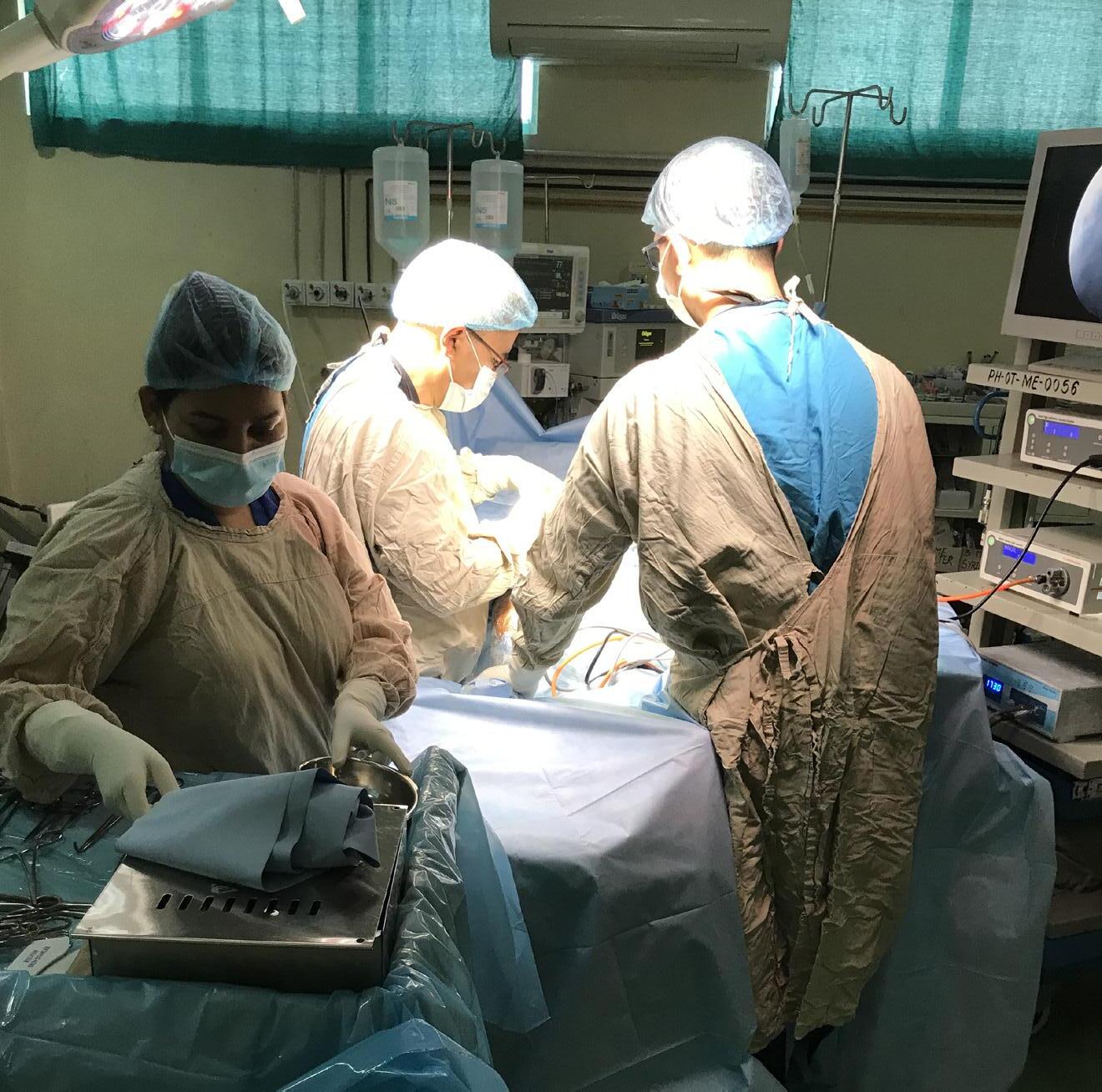

Patrick Neal is the father of Ollie Neal (2013-2020), who took his own life in 2021. Patrick told The 1633 about an ultra-event he completed last year in Ollie’s memory.
Iremember one of the last conversations I had with Ollie. I had always enjoyed singing with the school’s choral society and had just received the invitation to take part in the 2022 concert. Although he had left the school, we talked about the concert coming up again after the missed years of Covid, and he was very happy for me to carry on
taking part as he knew how much I enjoyed it.
Soon after that our lives changed forever when we lost Ollie. Of course all thoughts of things like singing went out of my mind, but later I did start to think I needed to re-start life, perhaps going back to the things I had enjoyed before. Singing seemed too social but my other love is cycling, something that can be

done solo which seemed an attractive option at that time!
I had been planning to ride an event called London Edinburgh London and it seemed to me something that Ollie would also have encouraged me to do. It’s an ultra-event, touted as Britain’s greatest cycling challenge, a largely unsupported ride there and back of 1,520km and 14,500m of climbing, to be done within a time limit of just five days. The only support received is at the control points on the way, where food and rudimentary sleeping

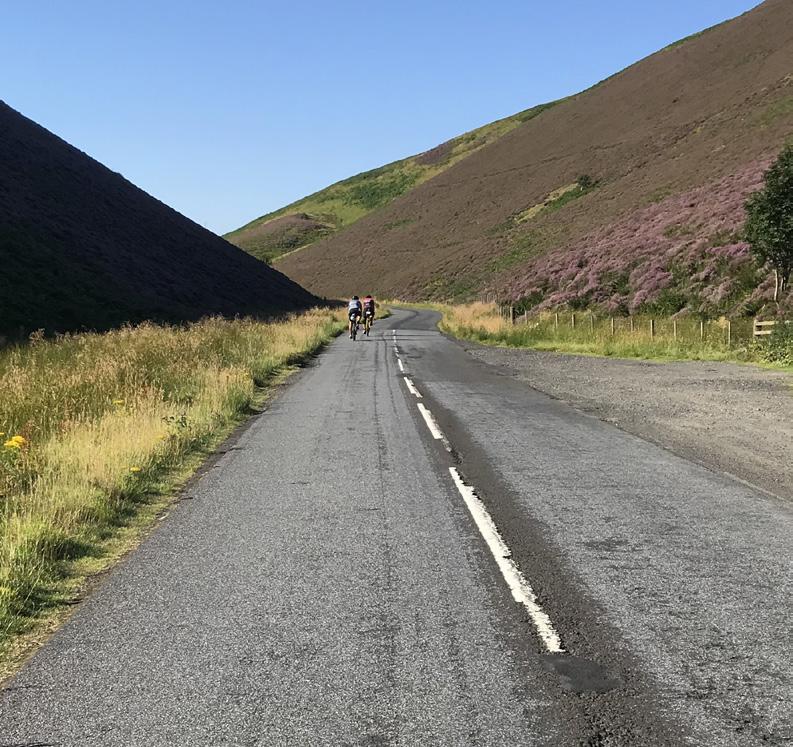
options are available. So, I finalised my entry and planned and trained for the event.
Encouraged by my wife, Elaine, and other friends, I decided to dedicate the ride to Ollie and raise money on the back of it for Pete’s Dragons, our local suicide bereavement charity that has been supporting us and many others, including some sessions with pupils at the school, since Ollie died.
Sunday 7th August, with a recordbreaking heatwave just starting, I and 1,550 other riders set out from
London heading north. Mostly on B roads we headed to the controls at St Ives, Cambridgeshire, then Boston and Louth. I stopped for the night, planning to be able to cross the Humber Bridge in daylight the next day. I teamed up with a local cyclist for a while who’d just come out for the chance of riding with some of the participants and having a chat! Support all along the route was fantastic with people out cheering and offering water and refreshments, which was very welcome given the temperatures.
I had opted to carry a tracker so people could follow my progress and had so many messages of support and encouragement throughout the ride. All of my cycle club seemed to be spending far too much of their day checking on me and offering thoughts on my progress and long-distance advice, partly because a mechanical problem had put me behind the clock meaning I had to change my plans, limiting sleep to just three or four hours a night. Early starts had their compensation as I saw a wonderful sunrise while crossing the old Forth Road Bridge.
Of course, thoughts of Ollie were never far from my mind, and the
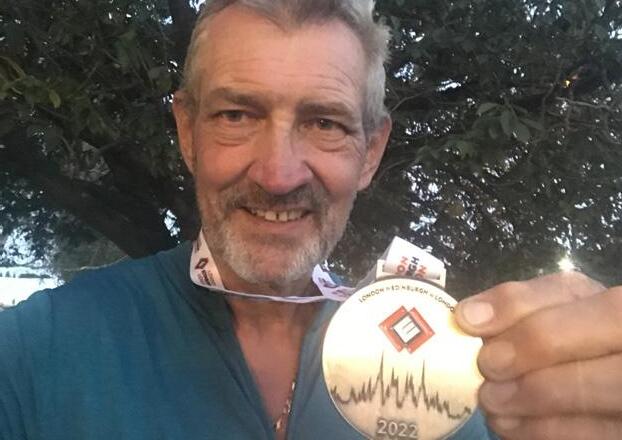
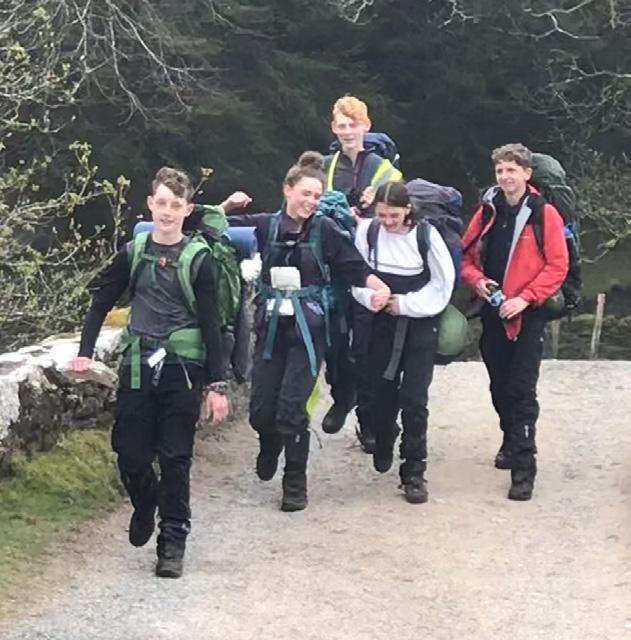
riding gave me time to think of him, seeing reminders along the way. This was especially so crossing the North Pennines, so bleak and reminiscent of Dartmoor, which was a place Ollie loved to go, despite some painful times when he was training for Ten Tors and suffering with joint pains in his knees.
The last couple of days saw 40+ degree temperatures, but I managed to finish about an hour inside the cut-off time. In total there were just 980 finishers from the 1,550 starters. I had raised over £4,000 for Pete’s Dragons and, even more importantly, our friends and acquaintances had been remembering Ollie while watching my progress, and continuing the conversation.
Ollie remains forever in our hearts. We hope that other young people who are struggling might feel able to reach out and share what they are going through in order to receive the help they need.
Samaritans are available 24/7, 365 days a year for anyone going through a difficult time. You can call them for free on 116 123, email them at jo@samaritans. org, or visit www.samaritans.org to find your nearest branch.
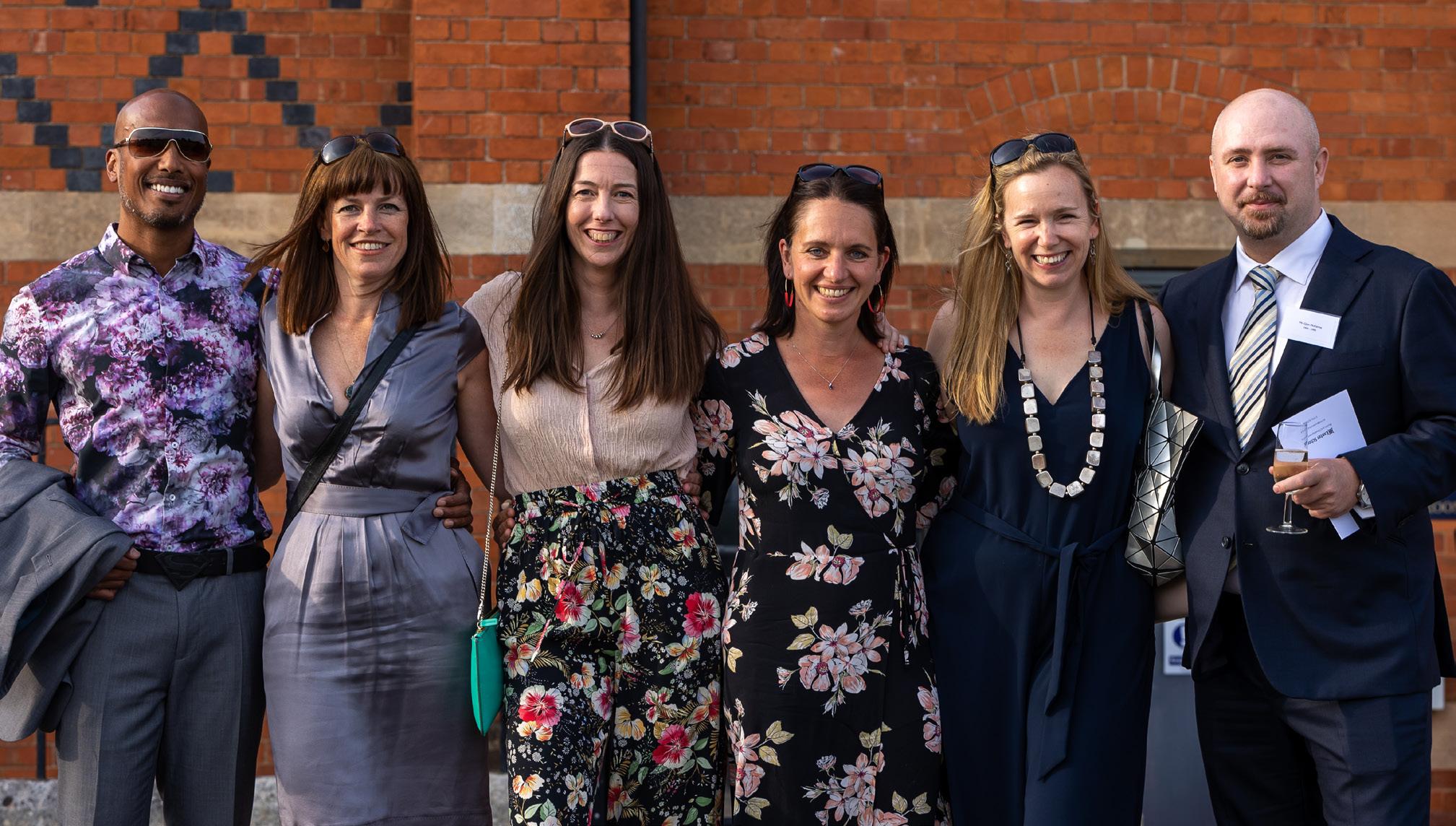
It has been wonderful to welcome so many alumni back to school over the past year, as well as gathering further afield.
The annual Old Exonians, Exeter School and Old Heleans Cliff Path Race took place on Saturday 1 June 2022 and was met with glorious sunshine. Exeter School was represented by Old Exonian participants Rees (Beemo) Jenkins (1988-93) and Jonathan (Bashers) Bashforth (1986-93).
The race began in Maer Road car park, Exmouth. Starting with a steep climb to the Exmouth cliff top, runners headed for the Geo-needle at Orcombe Point. Further climbing past the Geo-needle to the High Land at Orcombe followed before runners dropped down into the maze of caravans at Sandy Bay.
A steep climb up a fiercely steep and surprisingly slippery tarmac path put runners through their paces, before they headed down and out of Sandy Bay. After dropping into a wooded coombe, runners were required to navigate unwelcome steps firstly down and then back up to the summit at West Down. The last section of the climb required
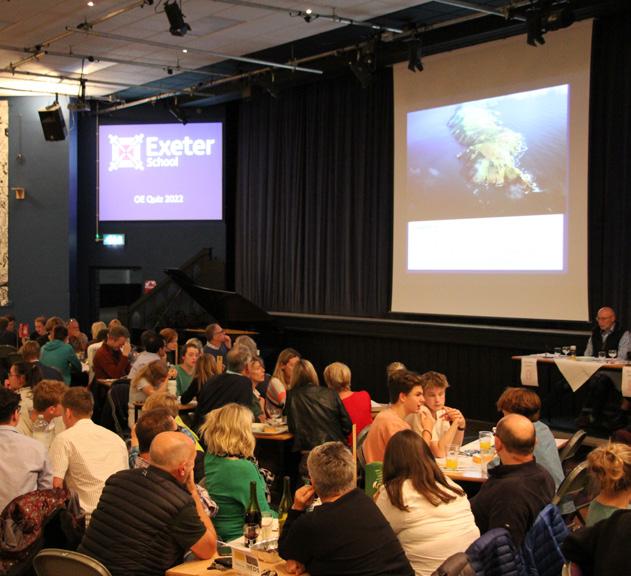
a breathless trundle up a steep pebble chute. Once the summit had been reached, a headlong descent through scrub and pine woodland led participants across the open grass lawn of Jubilee Field and ultimately to the finish line.
The race was won by John McCawley who was presented the race shield by former OE pupil and PH staff member Mr Kevin White. The race was officiated by OH Dave Phillips, OH Tony Pugh and Kevin White (1953-1961). Stay tuned for the 2023 race report.
In September we had the privilege of hosting a reunion for the class of 1952, welcoming David Reader (1948-1952) and Gordon Bess (1946-1952) back to school. David and Gordon left an extraordinary 70 years ago and were joined by Head, Louise Simpson, who greatly enjoyed hearing their memories of school over tea and cake. David and Gordon were also joined by our Alumni prefect, Toby, who was able to provide an update on what has changed for pupils at Exeter 70 years on.
In October a fantastic night was had by all that attended Exeter School’s annual OE quiz. Competition was fierce and the scores remained close. We were delighted to welcome teams from across the Exonian community, and raise funds for both the Exeter School Bursary Fund and The Ehlers-Danlos Support UK. Special thanks must be given to our fantastic quiz writers Steve Perring (1977-1981) and John Davidson.
Exonians in Cambridge
Head Louise Simpson was joined by Helen Sail (long standing geography teacher), and Gillian Hodgetts (198486; governor) at the informal drinks reception held at Jesus College. The alumni in attendance spanned multiple decades, the youngest having left Exeter School only two years ago and the oldest having left in
the 1960s! The diversity in age that our events attract always make for a fascinating evening of conversation.
Exonian lecture and class of 1962 anniversary
We welcomed Dr John Shears FRGS CGeog (1969-1980), veteran polar geographer and expedition leader, back to school in January as our guest speaker for the Exonian Lecture. His first-hand account of discovering the wreck of Shackleton’s Endurance and fascinating insight into his career as a polar explorer captivated an audience of over 300 people in the assembly hall. The day also included a reunion of our class of 1962.
London drinks and class of 2013 anniversary
February marked our ten-year celebration for the class of 2013 alongside our London drinks reception at The Lockhouse in Paddington Basin. Over 50 alumni joined Head, Louise Simpson and long-standing former teachers, John Davidson, Mike Porter, Mike Wilcock and Guy Willson. It was wonderful to see such a large group together with leavers spanning from 1958 to 2018.
St Margaret’s and Mount St Mary celebration
The alumnae of St Margaret’s and Mount St Mary were invited to a reception on International Womens’ Day 2023 in the Butterfield Hall. Stories of the relationships between the schools and Exeter School were shared over a glass of bubbly and some canapés.
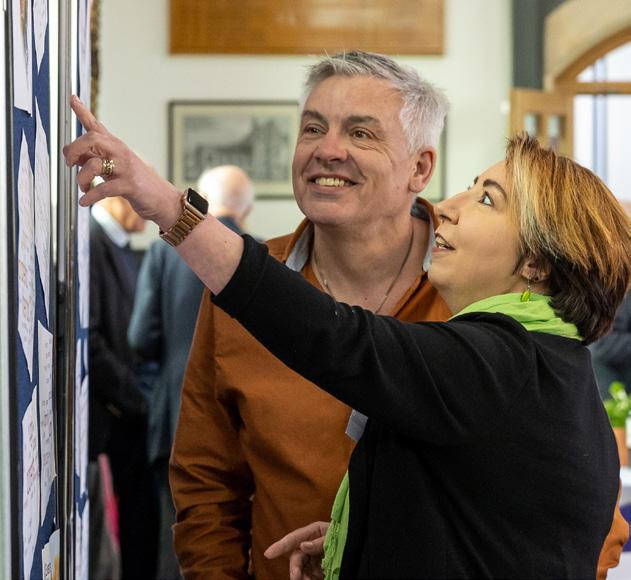
Donors’ lunch
In April, donors and legators to the school were invited to a special lunch and fascinating talk by former Director of Alumni Relations and teacher, John Davidson. Thank you to all our donors for their support.
Class of 1953 anniversary
The class of 1953 celebrated 70 years since leaving Exeter School this year and they were invited back to school in April for afternoon tea. Our guests delighted Head, Louise Simpson and archivist Kevin White (1953-1961) with a trip down memory lane.
Exonians in Bristol
In May, teachers Peter Boddington and Giles Trelawny headed to Bristol to join alumni for a wonderful reception in the spring sunshine.
London dinner
The Exeter School London dinner was hosted at The Clarence in Mayfair with alumni joining Head, Louise Simpson for a three-course meal. The cozy interior of the 18th century pub was matched by the warmth and affinity shared by all the alumni present. It was fantastic to welcome leavers from a far back as 1958 to share anecdotes and tales of their school days with more recent alumni.
OE day and anniversary dinner (’63,’73,’83,’93,’03)
Over 100 alumni and their families joined us at school for OE Day this June. It was wonderful to see the school so full of Exonians on such a beautiful day, with a whole array of activities available to those that came. Our anniversary dinner welcomed 80 alumni back for a drinks reception on the fields, before moving into the dining hall for a wonderful three-course dinner with a speech from Head, Louise Simpson.
OE cricket – match report from Andy Mason
On a slightly drizzly end of June evening, it was a real pleasure to be able to welcome back some of our younger OEs to play against the school’s 1st XI. Clearly inspired by Somerset’s batting in the T20
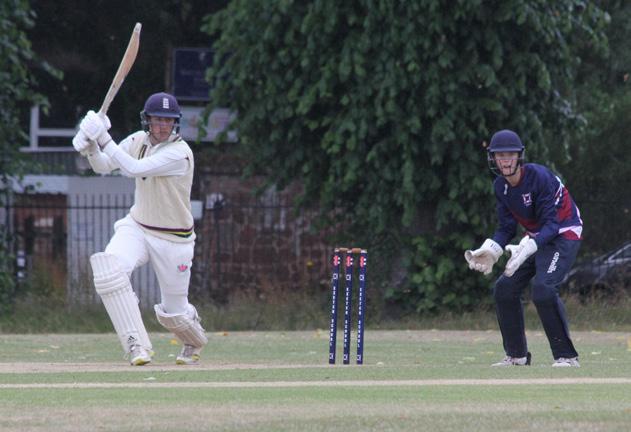
Blast the OEs hit the ball hard from the first ball going at 10 an over. Andrew Donovan’s 54 off 33 balls was followed by a quick fire 46 from James Horler. The school worked hard to take wickets and James Tyler led the way with three wickets. At the end of their twenty overs a rather daunting 197 was posted on the board for the loss of seven wickets.
The school set about their chase going at six runs an over but the loss of regular wickets hampered their cause. A good 38 from Harry Mount gave a foundation for the middle order to build on. When the change bowlers came on Harry Williams (76 off 40 balls) and Nate James (40 off 25 balls) were able to capitalise and the run rate sky rocketed. As the final ball was bowled the school needed four to tie the game but with only a single scored the win went to the OEs.
Post match it was great to be able to share a beer and talk about the good old days in the 1st XI.
It was fantastic to welcome OEs back to school for football and hockey matches against the school 1st XIs. Both games were tightly contested with the school edging the football game 3-1. After both games had concluded it was wonderful to share a drink and reminisce about former times in the 1st XI.

When former Head of Politics Ian Wright read Issue 2 of The 1633 in 2014 he spotted a small item on former pupil Will Harnden’s (1998-2005) appointment to Director of the Karen Hilltribes Trust (KHT). The KHT is a UK registered charity which is dedicated to supporting the Karen ethnic minority group in Northwest Thailand with clean water, agriculture and education projects. Ian got back in touch with Will to see whether his photography skills could help Will’s work, and The 1633 is delighted to share an account here of how former pupil and teacher have been working together (far!) beyond Exeter School.

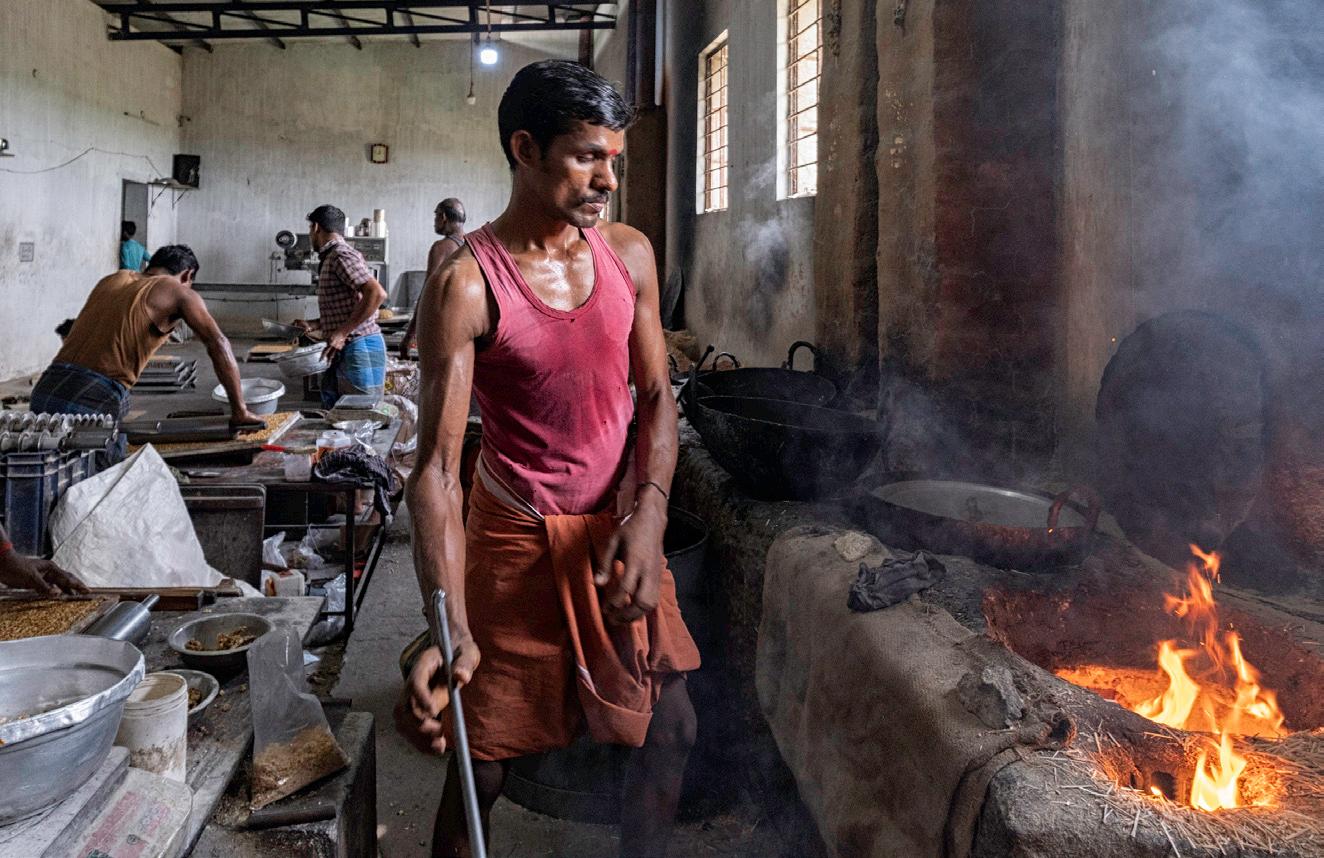
Ian Wright and Will Harnden first collaborated on the effective use of photography in international charitable work in Thailand in 2015. At that time Will was the Director of the Karen Hilltribes Trust, a UK registered charity which is dedicated to supporting the Karen ethnic minority group in Northwest Thailand with clean water, agriculture and access to education projects. Ian and his wife
Kitty – who is also a photographer – spent 3 weeks living in remote regions of Mae Hong Son province with Karen families and produced a comprehensive photography archive of the charity’s ongoing work in the region, and even more importantly, an insight into the everyday lives of the Karen community.
The photographs taken by Ian and Kitty have been used by the Karen Hilltribes Trust ever since to communicate the need of the

communities they support and the impact of their work, while all the time producing a perspective on local people’s lives that the viewer, however far away they may be physically, can associate with on a human level. The results of integrating this style of photography into the various communications of the charities work: project proposals, reports, website, and social media, have been significant. The Karen Hilltribes Trust was able to generate support for its work from donors all over the world, and has continued to successfully deliver its community focused projects since Will handed over as Director back in 2019.
For the past 3 years, Ian and Will have remained in close conversation about broadening the scope of this ‘documentary style’ photography by introducing it to a wider range of NGOs (non-governmental organisations) around the world.
Connected Development was founded in 2019 and is dedicated to promoting ‘community-led’ development, similar to the work of the Karen Hilltribes Trust, through the exchange of knowledge and resources. Connected Development now has 10 local organisations that

have joined its network as members, which are based in 7 countries across South America, Africa and Asia.
In October last year, Ian and Will travelled to Southern India to meet 5 different local NGOs, including current and potential new members of Connected Development, and work alongside them to integrate documentary style photography into their work. This was Ian’s 10th visit to India, a country where he had led several photography group excursions over the years. Will was visiting India for just the second time, though he had been providing remote support from the UK to projects there since the start of the pandemic. Over 17 days and 5 flights, they visited communities living in 3 of the southernmost states: Tamil Nadu, Karnataka, and Andhra Pradesh. Through Will’s liaison with the different NGOs and Ian’s ability to capture captivating scenes of community life, an engaging insight into community life in 2022 in Southern India was collected. Following several days of postproduction, Ian has created a digital archive of around 2,500 images that illustrate the context in which the different NGOs are working.
Connected Development will now share these photographs with each of the organisations that they visited, and then provide ongoing advice on how to use them effectively to communicate their work to a wide audience and develop new partnerships.
A strong theme of the local organisation’s work was the need for improved educational opportunities for disadvantaged children, many of them from families from the lowest socio-economic groups in society whose parents work for long hours in manual industries such as lime kilns, slate mines, and match factories. The Centre for Education and Development Action Research (CEDAR), in Tamil Nadu, is responding by setting up children’s hubs at the heart of the community, where supplementary school and creative education such as photography, art and filmmaking are taught.
Another area of focus was the establishment of alternative livelihood opportunities for families who are highly dependent on these tough manual jobs. ASSIST (a society for integrated rural development) is offering vocational


training courses and scholarship opportunities to the families of migrant workers in Andhra Pradesh. Each of these local organisations, led by Indian management and local outreach workers, have been tirelessly working on community development efforts for years, some of them since the 1980s. Behind each project is a series of fascinating stories to tell. Ian and Will hope that following their visit, and through the ongoing training Connected Development provides, that these local organisations will be able to continue their important work for many more years into the future.
If you want to find out more about Will and Ian’s work, or to contact the organisation, you can visit the Connected Development website at www. connectdevelop.org.uk
Ian would be pleased to hear from former pupils or colleagues, and can be reached at iangwright@hotmail.com
We are keen to share news from across the Exeter School community – please keep us updated with your activities, whether your most recent assembly was last month or last century!
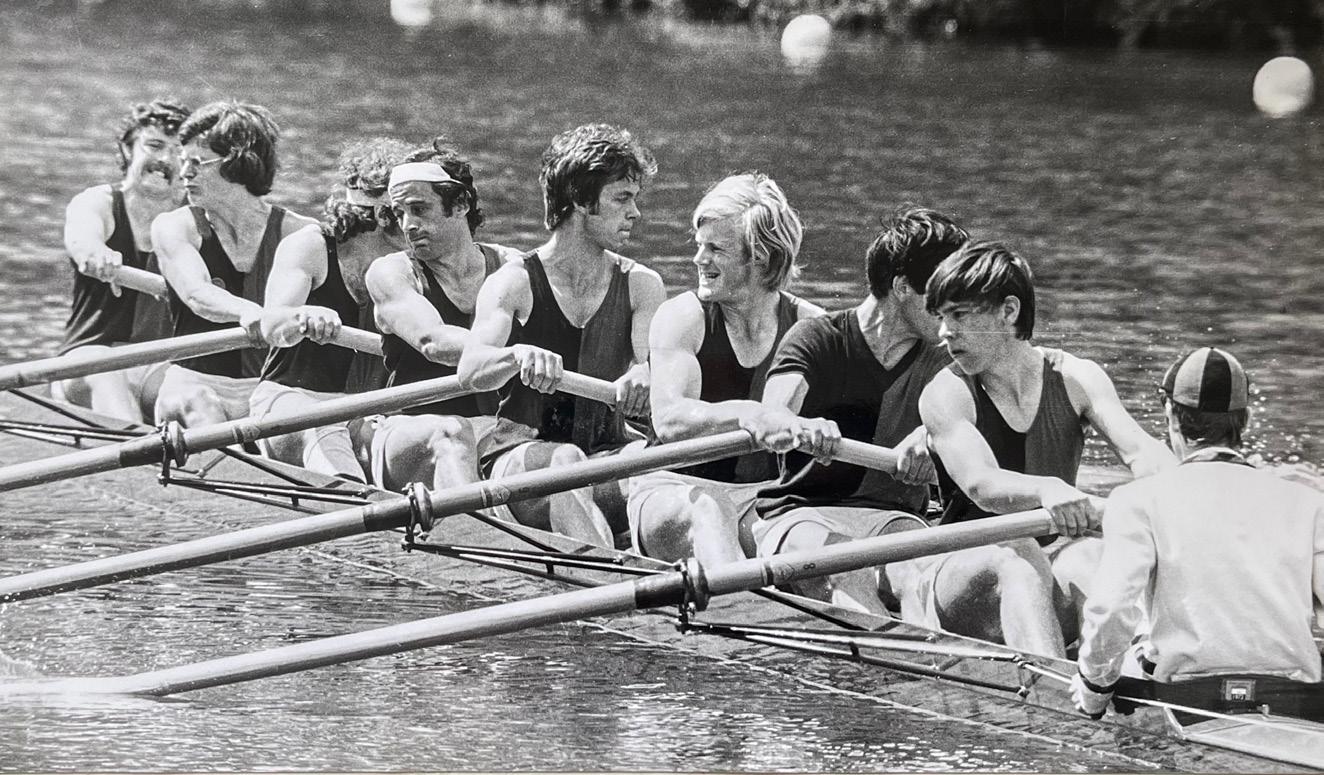
“I thought OEs of my generation might be interested in a trip down memory lane. I left Exeter School in the summer of 1969 with a place to read history at Jesus College, Cambridge. For that I owe a huge debt of thanks to Exeter School in general and George Ayres and Edward Revill (my mentors in particular). Both played very important roles in my life, giving me the priceless gift of a love of history and providing me with what I suppose we might now call ‘social mobility’.
Being only 17, I was encouraged to take a year off. I packed my Ten Tors rucksack, took my worldly wealth of 15 pounds and caught a train to London, then Cologne (I was fluent in German) and worked my way south ending up in Ibiza. Apart from one letter, there was no contact with my parents (they must have been out of their minds with worry). In September, I somehow received an urgent telegram which informed me that my ‘caution money’ had been paid to the College, that term started in two weeks and if I didn’t return immediately they were coming to get me! Two weeks later, and rather long
haired, sun-tanned (and completely lost), I found myself sipping sherry in the Masters Lodge. My fellow historians (straight from their public schools) asked me whether I had enjoyed the summer reading list from the College but sadly I had never received this! So…I found myself in College, a grammar school boy surrounded by students from the great public schools, totally unprepared and rather daunted!
Having never been particularly strong at any team sport (I usually played left out), I thought I might have a go at rowing… A year later and after a steep learning curve I was very fortunate and privileged to be selected as stroke of the College First VIII. This First VIII squad would go on to win every event in the Cambridge rowing calendar for 19712 and became Head of the River – a feat that the College’s Men’s First VIII has not repeated since (luckily, the College’s Women’s First VIII has been far more successful). I was particularly proud to see ‘Exeter’ after my name in the press reports at the time. I wanted to pass this story to the school and to those teachers who inspired me in particular.”
Tom Boother reached the pinnacle of his career to date in September 2022 as part of the Royal Marines Band Service. Not only was he part of HRH Queen Elizabeth II’s funeral parade, but he also undertook his first foreign trip to New York as part of the Atlantic trade forum. Tom joined the band service in 2018 auditioning on trombone, but with the trombone allocation full Tom spent two years learning the French Horn at the school of music in Portsmouth. To prepare for the Queen’s funeral Tom had to spend a week rehearsing in Hampshire before a 4am full dress rehearsal through the streets of central London on the day itself. Only two days later Tom was in New York playing at various hot spots such as the Empire State Building, Central Park and Grand Central Station, in order to promote the British Navy in the States. Tom would be delighted to hear from anybody who has any questions about the band service or how to join. Please email the Alumni and Development office if you would like to get in touch.
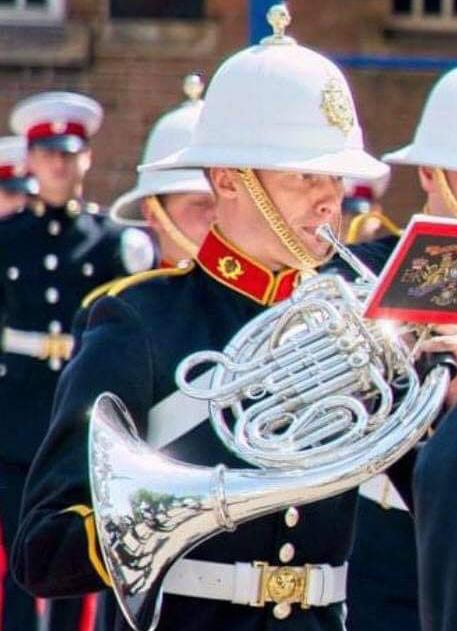
Stephen contributed some fascinating information to issue 14 of The 1633. He got in touch again with a short update on that publication.
“Kevin White’s evocative memories of Exeter School between 1953 and 1961 mentioned the school’s inspection day of June 1955, when Field Marshal Sir John Harding arrived by helicopter. However, according to my ‘annual inspection’ programme and notes, the date is recorded as Friday 20th May, 1955, which also was my birthday (age 14).
I was in Platoon No. 7 (‘Basic Section’), and it certainly came as a surprise to be offered a ride in the helicopter following an announcement to anyone having a birthdate that day! I still have a photo of the helicopter in a family album.
Kevin’s memories nearly match my own, which recall that some school dinners were enjoyable –especially the steamed syrup or jam sponge puddings, and jelly and cream: I was sometimes permitted to clean out the large serving tray, as being slim, the dinner lady could see I needed ‘building up’ !!
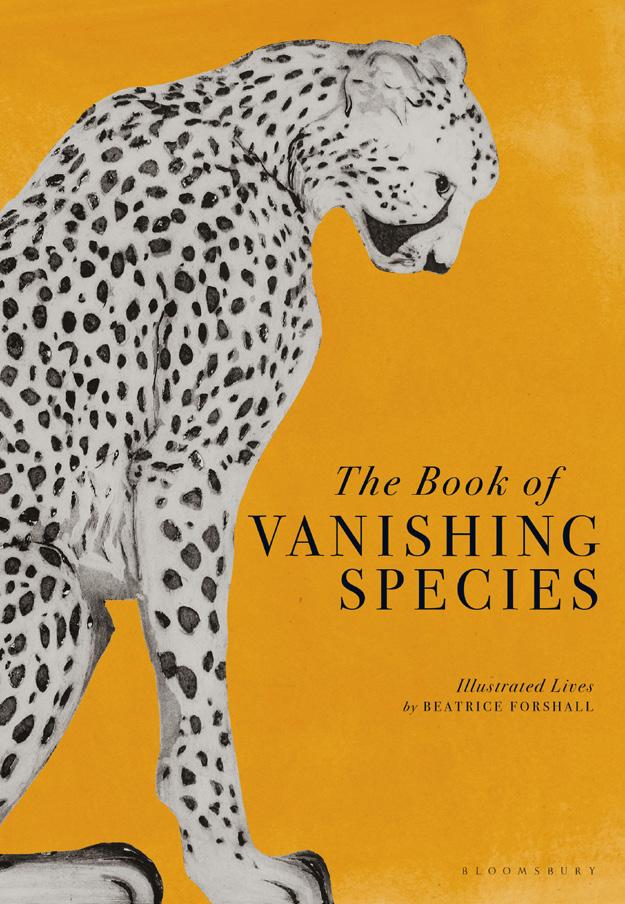

Since leaving Exeter School back in 2016 Ben Green has been fortunate enough to follow his dream of becoming a professional cricketer. He was awarded his first contract with Somerset CCC in October of that year. Since then he has made his debuts in all competitions, scored his first hundred, taken his first 5 wicket haul and captained the club in the Royal London competition. Which they won in the 2023 season.
Beatrice worked as artist in residence at the International Union for Conservation of Nature (IUCN), which researches endangered species. Her time there was one of the inspirations for her recent publication, The Book of Vanishing Species, which tells the stories of around 60 endangered species, accompanied by spectacular engraved illustrations. We were very lucky to have Beatrice visit the school and talk to her house, Crossing, earlier this year.
Jeremy was recently nominated for two awards in the Devon Farm Business Awards; the Farm Diversification Award and the Best Sustainable Farming Initiative Award. In both categories he made a shortlist of three before proceeding to win the Farm Diversification Award. Building on his late father’s work, Jeremy has strived to build a robust and diversified income stream for his farm so he is not fully reliant on what can be a very volatile means of farming income. This has resulted in a number of residential barn conversions lettings, a small caravan touring site, caravan and boat storage, a number of industrial storage units, and the sale of highquality beef and lamb under the Exe Valley Lamb banner. Jeremy has also changed the direction of the pure farming activity to focus on a more regenerative farming process – this is to build soil resilience and reduce artificial fertiliser inputs, thus improving the bottom line alongside environmental benefits. The judges were impressed by the range of activities undertaken, the attention to detail, the high levels in standards that had been aimed for – all whilst still holding farming as the core business activity.
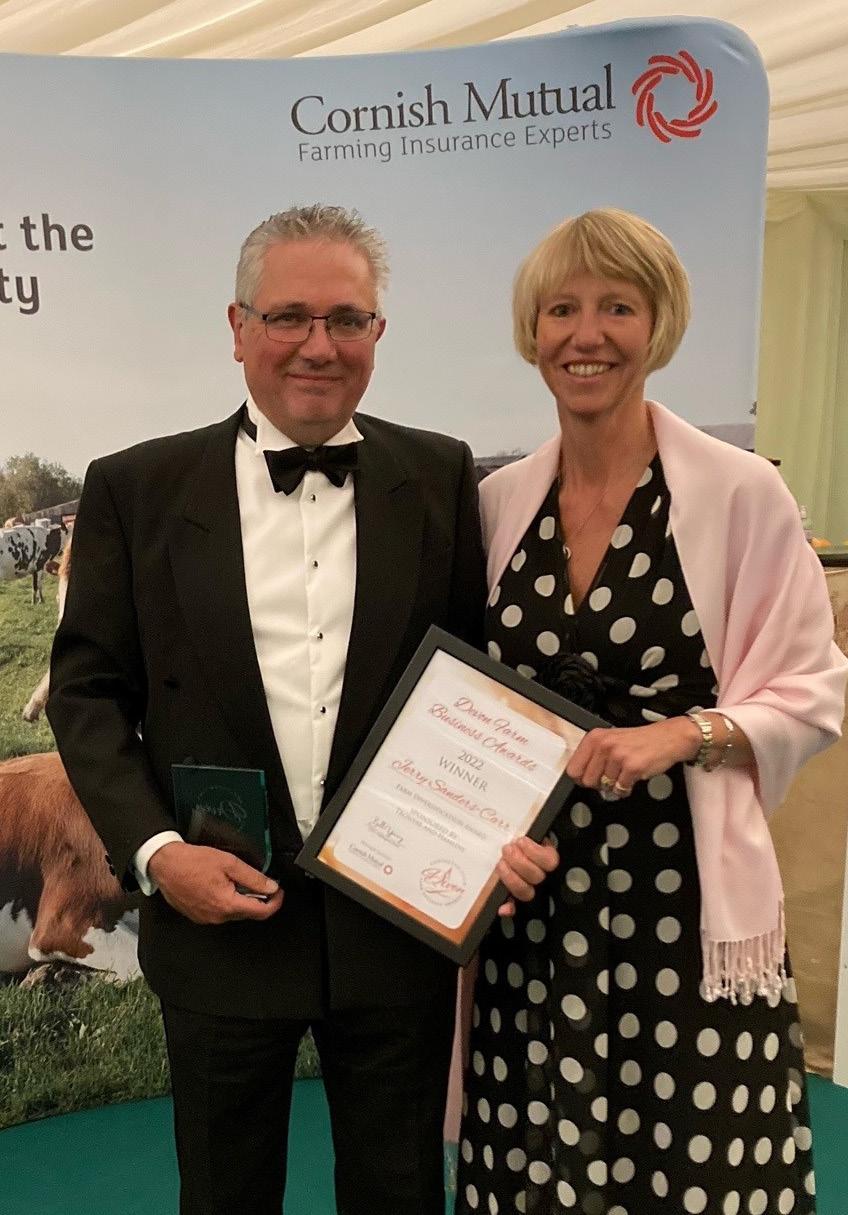

“Prague in the 1990s was a melting pot of different nationalities, cultures and interests all vying for supremacy in the aftermath of the November 1989 Velvet Revolution that rid the country of the Communist yolk. Amid this turmoil, in 2000 I witnessed the release of Wim Wender’s iconic film Buena Vista Social Club, a brilliant and touching chronicle of how guitarist Ry Cooder literally dug an entire generation of veteran salsa musicians out of oblivion and coaxed them back into the limelight, culminating in an unforgettable concert at the Carnegie Hall. The film includes amusing footage of the elderly musicians, who had never stepped outside Cuba, strolling through the streets of New York marvelling at the sights, especially fascinated by the tacky plastic busts of former US Presidents! In Prague, the film sparked a wave of salsa dancing that coincided with a kind of new-found feelgood factor pervading the luckier segments of society, both Czech and foreign. Salsa clubs sprang up everywhere like the ‘houby’ mushrooms of which the Czechs are so fond, spurred by a burgeoning Latin American community representing all of the continent’s countries: Cuba, Puerto Rico, Colombia, Ecuador, Venezuela, Argentina, Peru and Bolivia, to name
but a few!
In the midst of all this, I helped found one of Central Europe’s first salsa bands, which we named ‘Caribe’. We started off with a Ukrainian bassist, a Czech flautist, a Swedish trombonist, 3 Bolivian brothers on vocals, and yours truly on piano. From our humble beginnings rehearsing in a dingy cellar under a busy road with a noise level equivalent to an airport runway, the band gradually grew into a full 13-piece salsa orquesta: 1 flute, 2 trumpets, 2 trombones, 3 percussionists (conguero, bongosero, timbalero), 3 vocalists doubling on hand percussion, bass and piano. Do the math!
We performed in dance clubs and other venues (including the country’s first Carrefour hypermarket, which we helped inaugurate) for two years until I left the country in 2002 to come to France, but the band survived and I believe still exists to this day. It was a wonderful experience and I thank all those who inspired and helped build this great project and wish them the best of luck in their future musical careers! P.S.: The author nows lives in France but is still up to his old tricks, running a Latin jazz band called ‘PK Latin Project’. You can find us on YouTube and Facebook.”
Nathan Rodney Jones is studying English literature with creative writing at UEA in Norwich. He is has worked on a heritage project collecting stories from the residents of a local village regarding their interactions with a railway line that used to run through it. He has also performed a piece he has written about a church robbery in 1854 as part of the Studio Theatre’s ‘Dead Famous’ event in Ilfracombe.

Amelia Mugridge has been shortlisted for the Rainbow Honours as Corporate LGBT+ Champion of the Year for her work supporting the LGBT+ community at Serco. Amelia is a global co-chair of in@ serco the employee-run inclusion network focusing on LGBT+ inclusion alongside her day job in the commercial contracts team looking after a defence portfolio.
Mike Harris has come back to school as our squash coach – The 1633 caught up with Mike to hear about how he got involved with the sport.
“I was lucky to have two parents that loved squash and who were good players in their own right. I spent my early years in and around squash courts on a regular basis so it was quite an organic uptake! I played lots of other sports all the way through my school life but from the age of about 9/10 years old squash was the one that I really latched on to. I was very lucky to have the ever entertaining and irrepressible John Poustie as my history teacher – he was also Head of Squash at the time.
“I was at Exeter School until the end of my GCSEs, when I got a scholarship to Millfield School in Somerset, at the time the premier squash school in the country. From there I then went to UWE Bristol, studying for a history and philosophy degree at the same time as training full time and starting my pro squash career. I also started to coach on a regular basis.
“I was fortunate enough to then have a 13-year career as a professional squash player, travelling all over the world to compete in events, while still coaching when back in Bristol to help fund my playing. Sadly, professional squash does not pay as well as other some other sports, at least until you reach
Dear The 1633, I attended the Exonian Day in June. It was superbly well organised and with talks, tours, music in the chapel and various sporting activities something for all Old Exonians and their partners to enjoy.
However at tea time, I became very unsure as to whether I was in fact at Exeter School or Truro School. To my horror as a Devonian, some of the scones had jam on the
the top 50 in the world or so! I managed to get to 115 in the world, while also picking up my level 3 coaching certificate, working with the England Squash Elite Aspire Regional set up, and building my own coaching portfolio.
“I have been based in Exeter for the last four or five years. I coach mainly at Exeter Golf and Country Club, but also at the school and university, and I run the Devon junior squash set up as well! It has been great to get back involved with the school and try and help the teams come through at all age groups. It is obviously quite a strange experience coming back as a ‘teacher’ but I have really enjoyed it.”
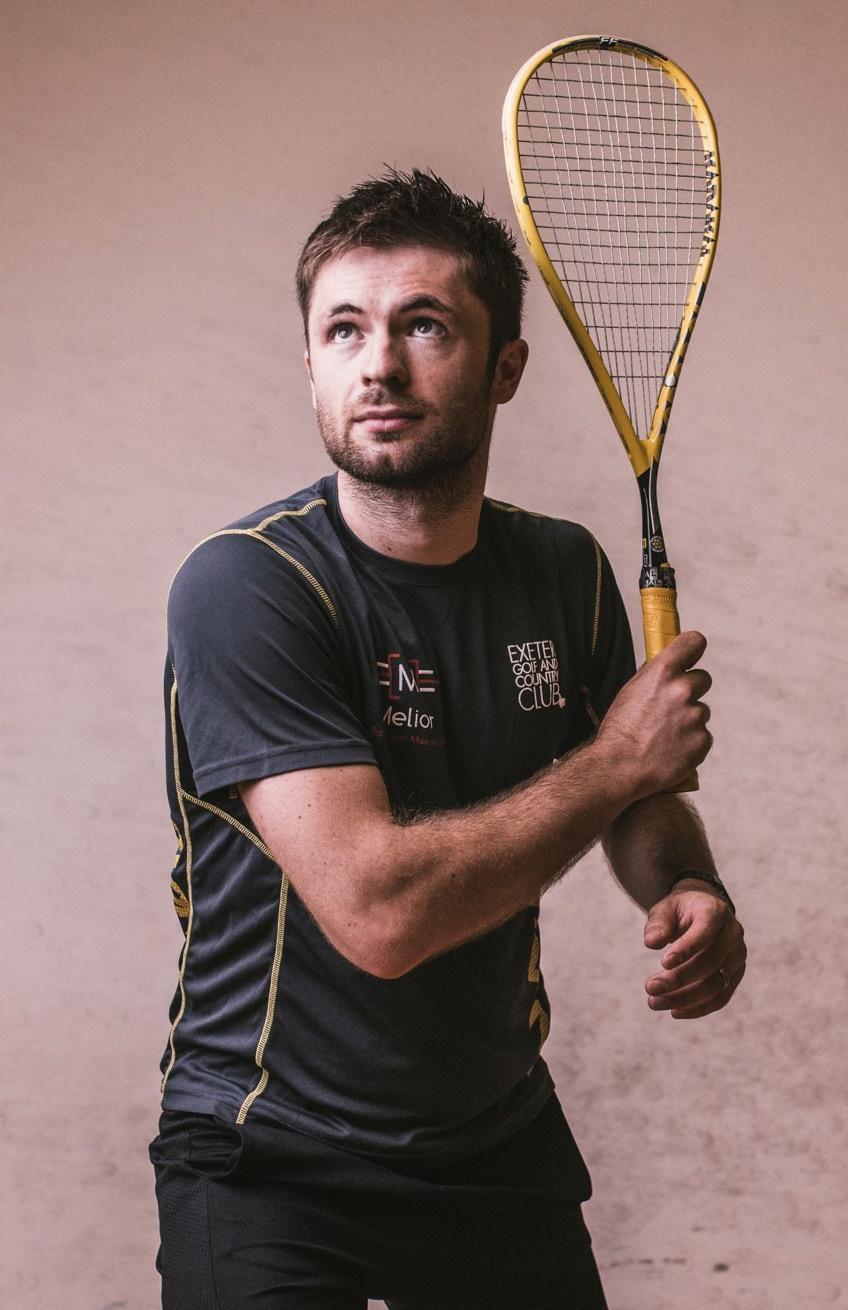
scone and clotted cream on top of the jam!
If I am to attend any future events at Exeter School I need to be reassured that in future the scones will all be served in the traditional and correct way, that is for the jam to be on top of the cream and not, as I understand, the way they serve them on the other side of the River Tamar. Yours sincerely, Robin Thomas (1964-1971)
The 1633: the school is very committed to inclusivity!
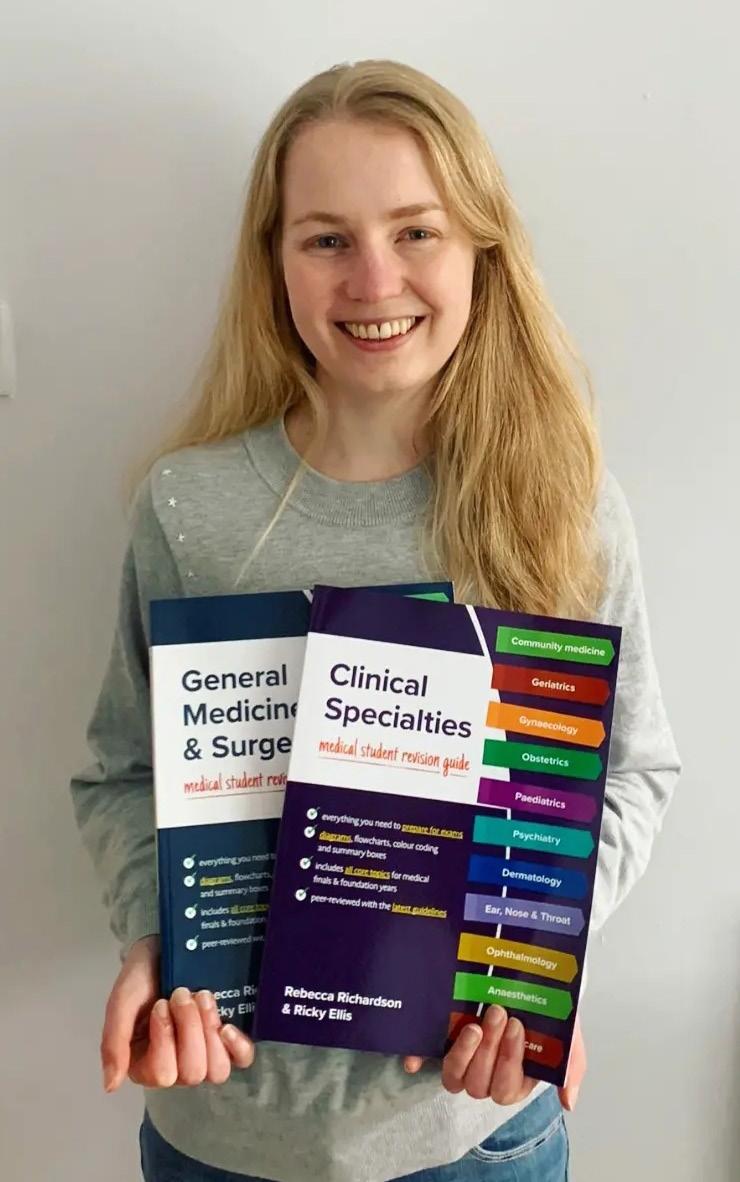
You might remember reading about Rebecca’s business selling her medical school notes to students across the country in last year’s edition of The 1633 magazine. We are delighted to share that, after two years of hard work, Rebecca has published these notes in two peer-reviewed textbooks: General Medicine & Surgery – medical student revision guide and Clinical Specialities – medical student revision guide. They have already sold over 700 copies. Rebecca said: “It took a lot of time and hard work to turn what were initially a random collection of my own notes, into two fully peer-reviewed and formatted textbooks. Doing this alongside my first few years as a qualified doctor was an even bigger ask! But I am so happy with the result and hope that they will now help hundreds of other medical students to get through their exams.”
Rebecca is about to finish her F2 year as a junior doctor and will then spend a year working as a clinical teaching fellow, continuing to support undergraduate medical students with their learning.
Hannah has had a very busy gap year. Early this year she travelled to Geneva to undertake work experience at the United Nations. She gained valuable experience in international diplomacy and an insight into a range of initiatives aimed at promoting peace, justice and sustainable development. Hannah attended meetings such as a review on the Convention on the Rights of the Child and a working group on discrimination against women and girls. Speaking about her time at the UN, Hannah said it “was a truly enriching and rewarding experience. The work provided me with the opportunity to learn and grow both professionally and personally”.
Hannah also ran the London Marathon in May, raising over £2,000 for Devon Rape Crisis.
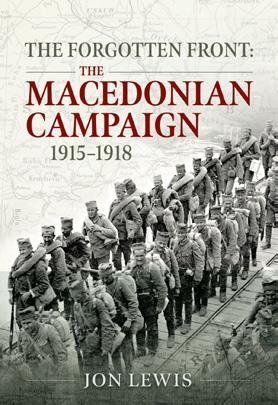
Jon Lewis has recently published a book on the Macedonian Front in WW1. He told The 1633 about the inspiration behind his work: “About ten years ago my grandfather’s WW1 diary unexpectedly turned up. I didn’t know he’d served on the Macedonian Front, in fact I’d never heard of the Macedonian Front. It seemed interesting, I started researching the part played by the British Army in Macedonia, and then, gradually, widened out into studying the history of the full five-nation Macedonian Campaign, based on a whole range of sources, mainly British and French, but also Italian, Serbian and German.
I found that despite the plethora of books on the Western Front,

the Macedonian Front has been almost completely ignored, in fact no book in English covering the full history of the Allied Army of the East has appeared for over fifty years. Such neglect appeared to me entirely misplaced; not only was it a fascinating story, militarily and politically, but the Allied Army’s triumph over Bulgaria in September 1918 and rapid lightning advance to the Danube frontier was a major contributing factor in bringing the War to an end in 1918, rather than dragging on into 1919. Seemed worth writing about!
When next in Exeter I will be glad to donate a copy to the school library, as a small thank-you for the excellent and inspiring history teachers I was fortunate enough to have had in the late ‘50s and early ‘60s, Eric Halladay, Dick Snailham and George Ayres.”
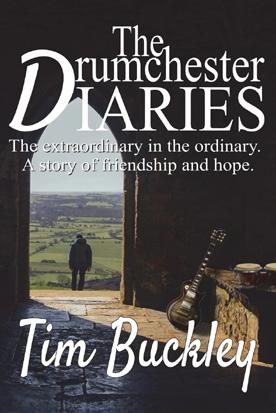
Reverend Tim Buckley has been serving as a vicar in inner-city Devonport for 20 years. Earlier this year he published his first novel, The Drumchester Diaries. Tim drew on his own childhood experiences of growing up by the Exe estuary to write the book. The diaries are a coming-of-age story centred around faith, love, and hope, as told by a group of friends whose lives gradually converge during their teenage years. The book has been positively received and Tim credits his love of creative writing to the time he was able to nurture this passion whilst at Exeter School.
James has recently completed his thesis on a new global ash model for multiple volcanic eruptions at the University of Bristol. He is about to start a graduate role at Shearwater GeoServices.
“In 2022, I have written an orchestral symphony in A major and am currently working on a 7-movement orchestral suite called ‘The Surrey Hills Suite’.”
If any news submitted has been missed from this article please accept our apologies and alert us to this oversight in order that we can rectify it.
The school is sad to announce the passing of the following Exonians. Thank you to the families and friends who have shared these obituaries with the school.
(Raleigh, 1956-1964)
1944-2023
Peter was born on 7th November 1944, in Bradford-on-Avon. He was adopted by Allan and Thelma Hayward on 10th April 1946. He had a happy childhood in Exeter and won a scholarship to Exeter School. In 1966 he went to the University of Leeds, graduating as a civil engineer. He was thankful that his adopted parents had shown him love and given him solid foundations for later life.
He married his first wife Pamela in Exeter in 1966 at a small ceremony. In January 1974 their first son Daniel James Hayward was born and in October 1975, a second son, Michael John Hayward was born. They divorced in 1987.
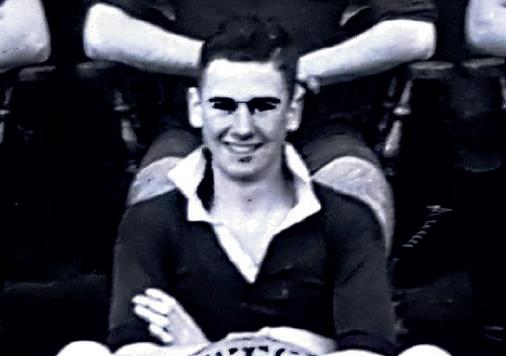
(Drake, 1943-1949)
1933-2022
His career as a civil engineer, after graduation, began in Hertfordshire but ultimately took him back to Leeds when he joined the British Waterways Board (BWB) in the early eighties. He remained with BWB until his retirement.
Fond of travel and adventure from an early age, he hiked in Austria and had many trips to the sea, canoeing and walking around the Devon coast with friends. In later life he spent a greater amount of time travelling to all manner of places around the world; he loved skiing and the sun; he was happy constructing paths, walkways, and aerial adventure playgrounds in the garden; he loved gardening but did not enjoy weeding. In the 1990s he found out that he had a half-brother and sister, both of whom he met in later life. He spent some happy times with Bob and Val.
In the 1990s he made a number of trips to Kenya and in 2007 he returned there; this was where he met Josephine. They married in 2010 and in August 2010 Solomon James Nzai Hayward was born; then two
Hywyn pronounced “How-wen”, was born to Welsh parents in Exeter. He was named after a 6th century saint and St Hywyn’s church can still be found on the north coast of Aberdaron. At Exeter School he became a keen rugby player, and in later years always enjoyed the Welsh international matches on television. On leaving school, he signed up for national service and joined the Welsh regiment in Korea as an officer. After his military service, which he loved, he joined National Provincial Bank as a cashier and learned the ropes in every department. Whilst working for the bank, he met the love of his life, Kay and they were married in September 1956 at St Mark’s Church Exeter. They were married for 65 happy years and had three children, David, Andrew and Clare.
Neil Cooper (Buller, 1944-1953)
Gordon Chanter (Drake, 1945-1953)
Ronald Darch (School, 1944-1949)
years later Amethyst May Randu Hayward came along – his very special daughter. His son Michael and his wife Margo had two children although Peter did not see his grandchildren, Charlie and Chloe.
A very strong willed, passionate, and intelligent man, Peter fought against injustice and wanted always ‘to do the right thing’. When he finally spent more time in Kenya, he found a number of practices of various bodies to be corrupt. Bribery was commonplace. He wrote countless letters to various departments about the bribery he found in everyday life. He told his youngest children that one day they could change Kenya for the better.
By those who survive him he will be sorely missed. One of his favourite sayings was:
“God grant me the serenity to accept the things I cannot change, The courage to change the things I can and, The wisdom to know the difference.”
Hywyn continued to work in banking for forty years. His final post was as bank manager for NatWest on Slough Trading Estate. Not only a talented mathematician, Hywyn was a highly skilled craftsmen, building furniture and clock cases. He could pretty much turn his hand to anything!
Hywyn passed away after a heroic battle with cancer. He remained proud and determined to the very end, always dressing smartly in shirt and tie! He leaves behind, two children and four grandchildren, but in the words of Vera Lynn, “we know we’ll meet again”.
Michael
Dee-Shapland (Buller, 1940-1947)
Andrew Goodridge (Crossing, 1961-1964)
John Govier (Buller, 1936-1943)
Ian Guy (School, 1977-1984)
Tim Hampshire (Crossing, 1987-1993)
Derek Hexter (Buller, 1949-1952)
Viv Jenks (Staff, 1998-2004)
Ken Kellaway (Staff, 1989-1993
Peter Ranft (Staff, 1986-2007)
Colin Roach (Buller, 1953-1960)
Elizabeth Searle (Staff, 1995-2003)
(School, 1965–1972)
1954-2022
Christopher Steward joined Exeter School as a boarder, joining his older brother Robin. Following the completion of his A Levels in 1972, he spent a year in Berlin where his parents were stationed, working as a locally employed driver for the army. Returning to the UK, he joined a firm of estate agents in Hastings, before moving on to property management. He went independent until age 53 when he quit working and instead relied on his own investments for income.
Christopher’s hobbies included gardening, skiing, and travel, with memorable trips to New Zealand and South Africa. Having learnt to sail on the Exe, he and his wife Monica, a languages teacher at Battle Abbey School, first sailed dinghies off St Leonards, before sailing a
 Andrew Buley
Andrew Buley
(Daw, 1970-1977)
1958-2022
25-foot cruiser out of the Rye. Their next larger boat they moved to Dover. Over the years they cruised extensively in Holland, France, the Channel Islands, and the south coast.
For the last ten years they sailed their 42-footer in the Ionian. After being diagnosed with bowel cancer in 2018, Chris underwent chemotherapy, radiotherapy and surgery on his liver but it had also spread to the peritoneum. Following this they sold their smaller boat in Dover and had their other boat skippered home from Greece as a more comfortable pied-a-terre. Sadly, Chris lost his battle in July 2022. Chris’ funeral took place on 10 August and a tribute page with photographs was set up in his memory at https:// christophersteward.muchloved.com.
Andrew enjoyed his time at Exeter School and was an enthusiastic member of the school choir and orchestra in which he played the trombone. He was also a soloist in the school’s Gilbert and Sullivan productions.
After leaving school Andrew started a degree course in quantity surveying at Aston. He realised that a career in the construction industry wasn’t for him when he had to go to a very high point, possibly on crane, above a site and felt very much out of his comfort zone! He didn’t really enjoy university life and returned to Exeter. He soon got a job with the TSB and forged a successful career in banking which saw him working at the headquarters in London before moving to Milton Keynes and then the subsequent headquarters in Birmingham. He relished the
Robert ‘Bob’ Smith (Crossing, 1948-1958)
Richard Stenlake (Drake, 1949-1954)
Nicholas Thompson (Daw, 1964-1969)
The Revd Ron White (School, 1947-1955)
James often spoke with fondness of his time at Exeter School, especially learning to fly gliders with the air cadets and as a member of the shooting team. After leaving school James went on to qualify as an accountant and also achieved an honours degree in maths. He lived in Lincolnshire with his wife and three children and was a devoted family man. He had a wonderful sense of humour and many interests including maths, astronomy, photography and music. He was an accomplished classical guitarist.
technological innovations which were taking place in banking and working on ways to promote these to customers. Following a period of ill health in his forties he spent some time in insurance and went on to work in customer service for a housing association.
Music was always important to him, and he continued to sing in Wiltshire where he and his wife, Miriam, and daughter Harriet, lived for over twenty years and were all very involved in village life. He was a keen walker and photographer. He spent many walking holidays in the Lake District with Miriam. Sadly, Andrew realised last year that he was not well when he was finding difficulty on inclines. His illness progressed rapidly and despite an early response to treatment he passed away at Dorothy House Hospice, near Bath.
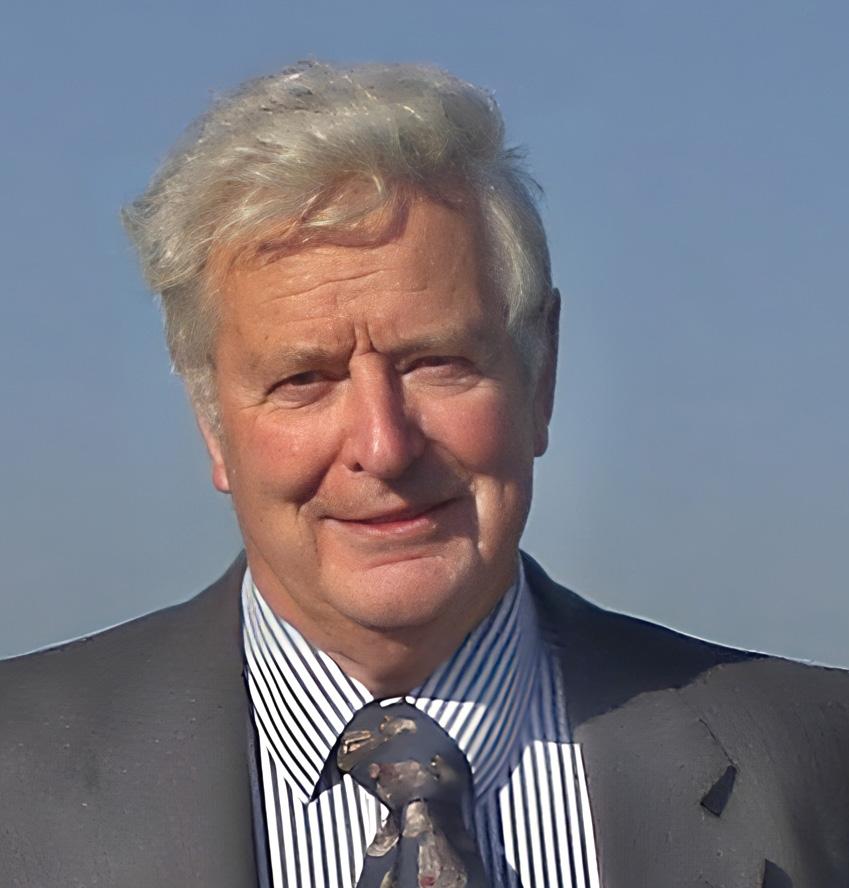
David Revill was born on 28th August, 1937, in Nottingham, to Stan and Phillis Revill. He grew up in Sherwood, to the north of the city. Stan was a history teacher at the Henry Mellish School in nearby Bulwell and was a keen archaeologist. This, no doubt, sparked David’s love of history and laid the foundations of his future career.
David attended Nottingham High School where he thrived, representing the school in both cricket and rugby, as well as holding the school discus record and becoming Head Boy. He captained the under-21s Three Counties rugby squad at the age of 18.
During this time, he also met Ann, his future wife, at church where he was a member of the choir.
Having secured a place at Jesus College, Cambridge, to read history, his life, as with most of his
generation, took a detour through national service.
David was not admitted to the forces by virtue of an ear infection caught through his rugby activities, but instead served with the National Forestry Commission in the Quantocks in Somerset, billeted at the Farmers Arms at West Hatch.
During this time, he continued with sport, playing for Taunton Rugby Club, and also became involved with the local amateur dramatics society.
Post-service, David graduated from Jesus, having also been elected as secretary of the junior common room and amalgamated clubs in his final year.
David’s time with the Forestry Commission had obviously engendered a love of the Southwest and, having started his PGCE at university, he joined the staff at Taunton School where he completed
his qualification.
He felt very settled in the West Country and, having put down roots, he proposed to, and married Ann in 1962.
He joined the staff at Exeter School that same year to teach history, initially living in the west of the city. They had two sons, both to be later educated at Exeter School.
By this time, David had been appointed School House Master, to live in the school’s iconic tower and look after the school’s boarding community.
In 1981 he took up the role of Deputy Headmaster under the then Headmaster, Geoffrey Goodall, and moved out of the tower to the family’s current home within walking distance of the school.
He was involved in many extracurricular activities including coaching the rugby first team, cricket, Dartmoor Ten Tors events and stewarding the model railway society.
He was also involved in the writing and production of the Exeter School masters’ reviews, self-referential theatrical comedies involving both staff and pupils, which raised substantial funds and notable publicity for the school.
David helped organise and run many school trips for pupils, both within the UK and abroad, most notably Italy where he could share his great interest in Renaissance history, art and architecture.
After retirement, in 1998, these trips continued, swapping pupils for friends and ex-colleagues.
He also managed to go north, finally getting to the Orkneys and Outer Hebrides where his interest in prehistoric Britain had always been drawn.
Retirement also allowed Ann and David time and freedom to indulge their mutual love of art and architecture, following “church crawls” and becoming avid collectors of early 20th century English print makers.
David passed away peacefully on 10th January, 2022, after a long, very happy and fulfilled life. He leaves his wife Ann and sons, Richard and Charles.
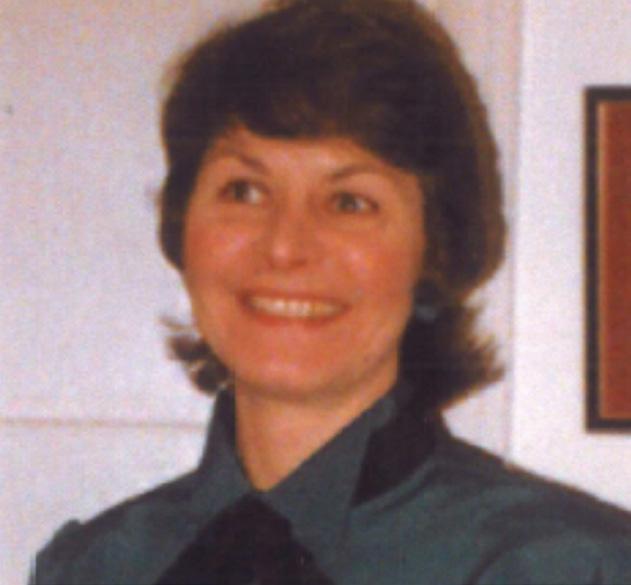
Julie was born in Kingsteignton in 1941. She was educated at the local primary school and Newton Abbot Grammar School before taking a degree in history at King’s College, London. After graduating, Julie taught at Tiverton Grammar School before joining the Staff at Exeter Preparatory School in 1968. She worked at Exeter School for 28 years until taking early retirement in 1996.
Julie first taught in the prep school on a part-time basis while caring for her children, Simon and Sallianne. She was soon a full-time class teacher and spent her final seven years preparing pupils for progression to the main school. Julie also made her presence felt in the Third Form of the main school where she taught English for many years. Like so many teachers she also filled many ancillary roles especially at school functions. She was very much involved with school and charity fund raising. Julie’s appearances in staff reviews will be remembered by many, not least by her pupils!
Julie’s talents really shone through her work producing many school plays. Her enthusiasm for each performance, her patience, and her calm demeanour amidst rehearsals, enabled her to create fantastic shows. It was well known that she never lost her sense of fun.
Julie’s dedication to Exeter School
went far above the call of duty and will most certainly be remembered and appreciated by pupils, parents, teachers and generations of Old Exonians. Her helpful advice and support for colleagues, her professionalism and sense of fair play was much appreciated, as was her quiet, disciplined approach in the classroom, which helped countless pupils achieve success in a variety of subjects.
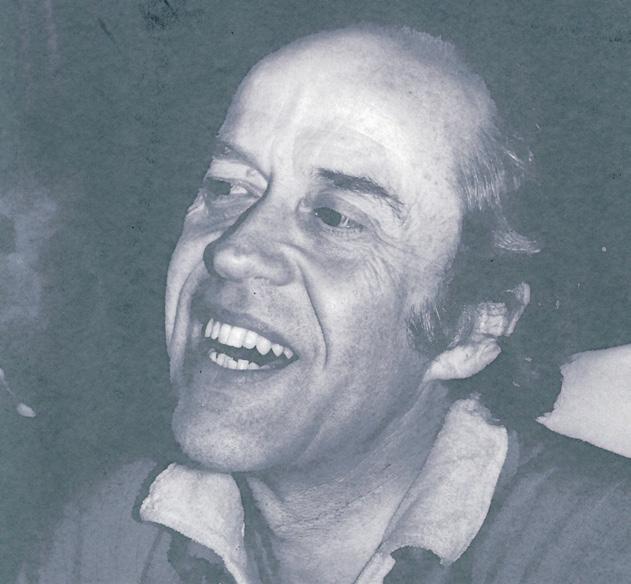
‘Her helpful advice and support for colleagues, her professionalism and sense of fair play was much appreciated’
Following retirement Julie spent time improving her golfing handicap at East Devon Golf Club, playing tennis and travelling. An avid reader, Julie also much enjoyed time spent with her book club and continued, with John, to entertain her many friends at home. Julie died peacefully after a short illness at Exeter Hospice on 21st June 2022 and is greatly missed by all whose lives she touched.
Many family members, former colleagues and friends attended a thanksgiving service at Exeter School Chapel in September. John Henton (former School Chaplain) officiated at the service in surroundings so familiar to Julie during her time at the School. Her family wish to thank Exeter School, John Henton and Alice Holohan (Director of Development and Alumni Relations) for the support provided.
John was a man of Devon and was born in Exeter in 1927. After Exeter School he attend Sherborne School and then read medicine at St John’s College, Cambridge. He was a keen sportsman and was captain of the university cross country running team. He completed his medical training at St Thomas hospital. During his national service, 1953-55, he was a junior medical specialist at Netley Hospital in Southampton. He subsequently continued his medical career in London working at the Brompton, St Mary’s and Middlesex hospitals.
He married Elisabeth in 1949, with whom he had four children, Charlotte, Marc, Victoria and Adam. After retiring in the late 1990s he returned to Devon and lived in Widecombe in the Moor with his second wife Jane. Here he devoted his time and energy to cultivating what become an extensive and renowned wild flower meadow. John died peacefully on 19 April 2020 at his home at Southcombe. He is missed by his much-loved grandchildren and many friends.

Julian entered 3A in 1955 but we first met in 4A in 1956. He was, somehow, the typical, seemingly average, schoolboy, neither brilliant nor dull, witty but not hilarious, better than averagely competent at rugger, but not really all round sporty, happily comfortable at school, but not a star, nor anxiously competing to be a star at any of those things. Just a very nice, kind, mischievous lad who fitted in with the rest of the average ‘us’. But, at the same time, Julian was very different from all the rest of us because he was, unquestionably and obviously a REAL musician.
He became, quite quickly and with Ivan Cole’s nurturing, basically the only competent chapel organist during that decade. And Julian, in the Crossing Club, then an exclusive, 12-member dining and debating society, was a vigorous defender of socialism, unusual in the school politics current in the early 1960s, but certainly brave.
Julian went up to St Catherine’s College, Cambridge in 1962 and very quickly developed a reputation for orchestral direction, with Raymond Leppard. He began a deep interest in opera and was a leading light with the Cambridge Purcell Society, conducting a notable performance of
The Faerie Queene in the mid ’60s.
After graduating, Julian went on to begin a PhD on the Venetian composer Carlo Pallavicino, who worked in both Dresden and Venice in the late 17C. Julian did most of the original research on this in Venice. He never actually finished his doctorate, but got married to his first wife, Kate Reed, and was appointed to a lectureship at Nottingham University.
But opera was, unquestionably, his true calling and he soon moved to Cardiff where he was, initially, appointed repetiteur, then Head of Music in the relatively newly formed Welsh National Opera (WNO). He continued with the WNO for much of his career with many notable successes. He particularly enjoyed conducting Verdi’s Don Carlos and was a specialist in bel canto. At the same time, in the mid 1980s, he began with the BBC Wales “World Singer of the Year” competition. This involved his travelling to audition and select singers from 50 or so countries to be brought to Cardiff for this competition.
He was visiting conductor to many world class orchestras, among these, San Francisco, Vancouver, Sydney, the English Chamber Orchestra and the London Sinfonietta. Also, during this time, he performed as an accompanist to, among others, Bryn Terfel and Charlotte Church, for whom he made a number of successful arrangements.
In 2016 Julian was commissioned by La Scala to reconstruct Verdi’s original, 1904, score for Madama Butterfly. This opera had been panned after its first performance and was subsequently republished in a more popular format. Julian researched and restored the original score and was honoured in Milan at La Scala at the opening of the “Original score of the Original” performance.
Latterly, Julian, whose skills as an accompanist were always strong, worked with his second wife, Mirouslava Yordanova, rediscovering, amongst others, song cycles including those of Pauline Viardot, a famous mid/latter
nineteenth-century mezzo-soprano.
Julian achieved world-wide recognition and success. He was a pianist, organist, orchestral conductor, significant international musical scholar, chorus master, and accompanist, but, most of all, a thoroughly nice bloke and good friend over almost 70 years and I will greatly miss him.
Julian Smith died in Cardiff during the night of 1st February 2023. He leaves a daughter, Alex, a son, Harry, and 4 grandchildren.
Obituary written by James A. White (Daw, 1954-62). For the full version of this obituary please see the school website
Obituary published in the Church of England Newspaper.
We are saddened to announce the death of the Revd David Alexander Grigor on 18th December 2021 aged 92.
He served as: Curate of Christchurch, Hengrove (1954-57); Curate of St Mary’s, Marshfield (1957-60); Vicar of St John the Baptist, Newport, Barnstaple (1960-67); Vicar of St Paul’s, Preston, Paignton (1967-1973); Vicar of Christchurch, Rio de Janeiro (1973-74); Chaplain to Exeter School and part of the ministry team at Heavitree Parish (1974-77); Chaplain to Brighton College (1977-88); Chaplain to Warminster School (1989-92); Part-time chaplain in San Pedro, Costa del Sol (1993-94); Part-time chaplain at St George’s Tunis (1996-98).
1933-2022
Obituary from newspaper SUR in English.
Former SUR in English Pet Care columnist, Peter Harrison, has died at the age of 89. For more than 30 years, Peter and his wife Erny shared their love of animals with readers, offering their advice on a wide range of issues relating to pet ownership in southern Spain. Born in Devon on 1 February 1933, Peter studied in Exeter before serving as an army officer during the Suez campaign in Egypt. In 1957 he started working in commercial television, becoming deputy Midlands controller for Associated Television in Birmingham. He then moved to London to join publishing firm McGraw-Hill, becoming international sales director, a job that took him around the world. After meeting his wife Erny in the Netherlands, the couple spent several years running a hotel on Dartmoor in the south of England. They came to live in Spain in 1988, staying first in| their holiday apartment in Marbella and then moving to Alhaurin el Grande, where they opened the Petcare Kennels, which they ran for 13 years. They later moved to the Alora area. Peter’s love of animals accompanied him throughout his life; he was a qualified riding instructor and took an interest in animal welfare while travelling around the world. He played an active role in the campaign to remove the quarantine obligation for pets being taken into the UK. Peter leaves his wife, Erny, and son, Neil.

Sanjay Mortimer passed away on 27 November 2021, at the age of 32. He attended Exeter School from 2001 to 2007 and was in Buller House. He was an engaging and innovative young man who enjoyed experimenting with electronics and design. He participated in the Ten Tors challenge and represented the school at target shooting. After leaving school he went on to captain Newcastle University’s under 21’s team. In his leavers book Sanjay was noted as having ‘dazzled an entire year group with boundless knowledge and massive hair’.
After completing a masters in computer science at Newcastle University, and a PGCE at Exeter University, he taught at Wymondham College for one year. Experimenting with a 3D printer for his technology classes, Sanjay designed an improved nozzle for pocket money purposes. Once manufactured it sold out in 48 hours. This was the starting point for his globally successful company E3D online, which was regularly placed in Sunday Times Tech Track 100. Sanjay was renowned within the industry as a talented engineer and an eccentric world-class inventor who was hugely generous with his knowledge.
In 2018 Sanjay got married in
a villa in Rome amongst friends, family, sunshine and stunning Italian food. He is hugely missed by his family, friends and the wider industry-based community.
Sanjay’s vision and spirit lives on in the Sanjay Mortimer Foundation. The charity works to support gifted engineers who think differently (like Sanjay did), but that lack the resources to gain greater engagement with education through 3D printing. At the charity’s first fundraising event, global collaborators printed 3D tiles of Sanjay’s silhouette. These were joined to create a single mosaic – a fitting tribute to Sanjay’s worldfamous hair and his contribution to the industry.
‘Sanjay was renowned within the industry as a talented engineer and an eccentric world-class inventor who was hugely generous with his knowledge.’
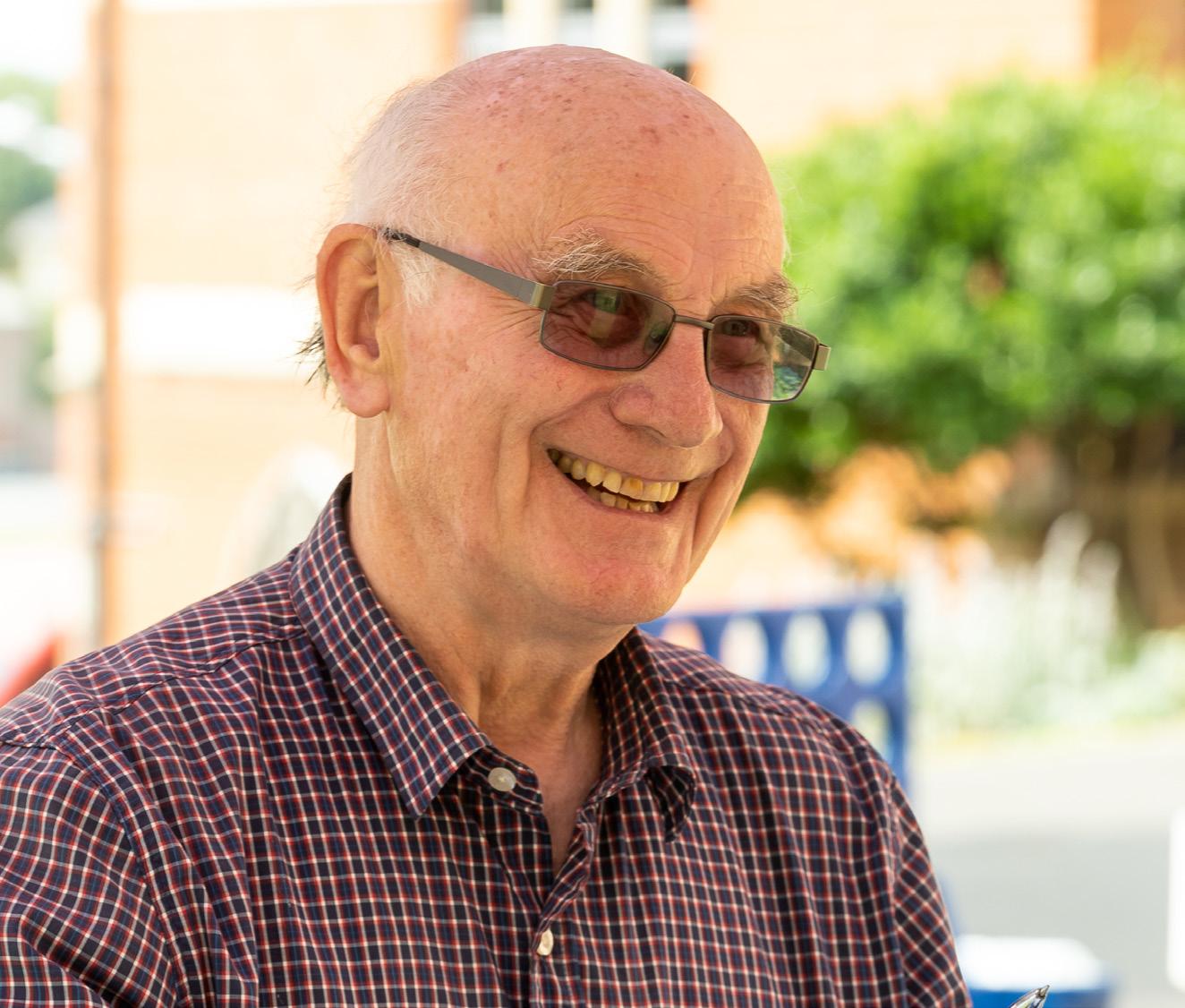 Trevor Huxtable (former staff, 1985-2004) at OE Day
Trevor Huxtable (former staff, 1985-2004) at OE Day
The Alumni and Development office are always interested in hearing what you are up to and will support you however we can. The 1633 has rounded up just some of the benefits of being an Exonian below. To take full advantage make sure we have your current contact details – you can update them via our website or by contacting the office.
There are Exonians all over the world with expertise in many different fields. If you need some career advice, then the Alumni and Development office will happily try and connect you with an Exonian who might be able to help.
If there’s something that could benefit your studies, or if you are involved in a project that helps others but needs a boost then consider applying for an OE Grant of up to £250. You can find further details on the school website.
Join old and new friends at alumni events – there’s a wide range: broaden your mind at a lecture or quiz, enjoy socialising with old classmates at a formal dinner, or perhaps set foot on our sports pitches again.
Find out how your old school is looking today via our half-termly eNewsletter and social media channels.
The Exeter School Alumni (Old Exonians) Linkedin page is a closed group for Exeter alumni. Feel free to pose questions, post job adverts or share an update.
Is there someone from school; a friend or a teacher that you have lost touch with but would like to connect with again? Let us know and we can try and put you back in touch.
Get in touch to request details for the school digital archive and WhoZatFace and explore the resources about the school’s history. New resources are regularly added by the Alumni and Development office.
Please get in touch if you would like to see your business featured in the next edition of The 1633. We have a worldwide circulation of over 6,000 readers.
Making a donation to our bursary fund or coming back to the school to share your time and expertise with our pupils can be an incredibly meaningful experience. Get in touch to find out how you can be involved.
Thank You
Thank you to the following individuals who have made gifts to the school since September 2021. We are very grateful for your support.
Tim and Moira Armstrong
Stephan Arthur (1961-1968)
Vasile Badescu and Lucia Popescu
Roger Bagnall (1941-1952)
Lynne Barker-Privalova (2012-2014 – former staff)
Martin and Wendy Barratt (1982-1983)
Richard Barrett (1957-1966)
Nicholas and Rebecca Batchelor
Paul Beckett (1973-1980)
Franklyn Bovey
Malcolm Brook (1949-1954)
Hugo Brooks (1969-1974)
Emil and Rebecca Budiman
Paul Darnley (1982-1988)
Neil Downes (1953-1960) and Mary Downes
Stephen Derek (1954-1959)
Nigel Edwards (1976-1983)
Paul Ellis (1970-1978)
Miquel and Vania Ferreira Castro
Michael France (1962-1968)
Ro Garnham
(1993-2009 – former staff)
George Garner (1982-1994 – former staff)
Emad George (1976-1982)
Eddie George (1977-1983)
Richard Gilpin (1974-1978)
Geoff Goodall (1979-1992 – Headmaster)
Andrew Gray and Lucy Berridge
Peter Green (1977-1985)
Robert Guyver (1957-1964)
Paul Harrison (1968-1975)
Dean and Victoria Hocking
Stephen Hodder (1969-1976; governor)
Alice Holohan (2021-present – staff)
Quentin and Tracey Howe
Jonathan and Alison Howell
John Imlach (1950-1957)
John Jago (1949-1956; former staff)
Robert Johns (1960-1966)
Richard Jowett (1948-1959)
John Knowles and Saskia van De Ridder
Peter Kumik (1976-1982)
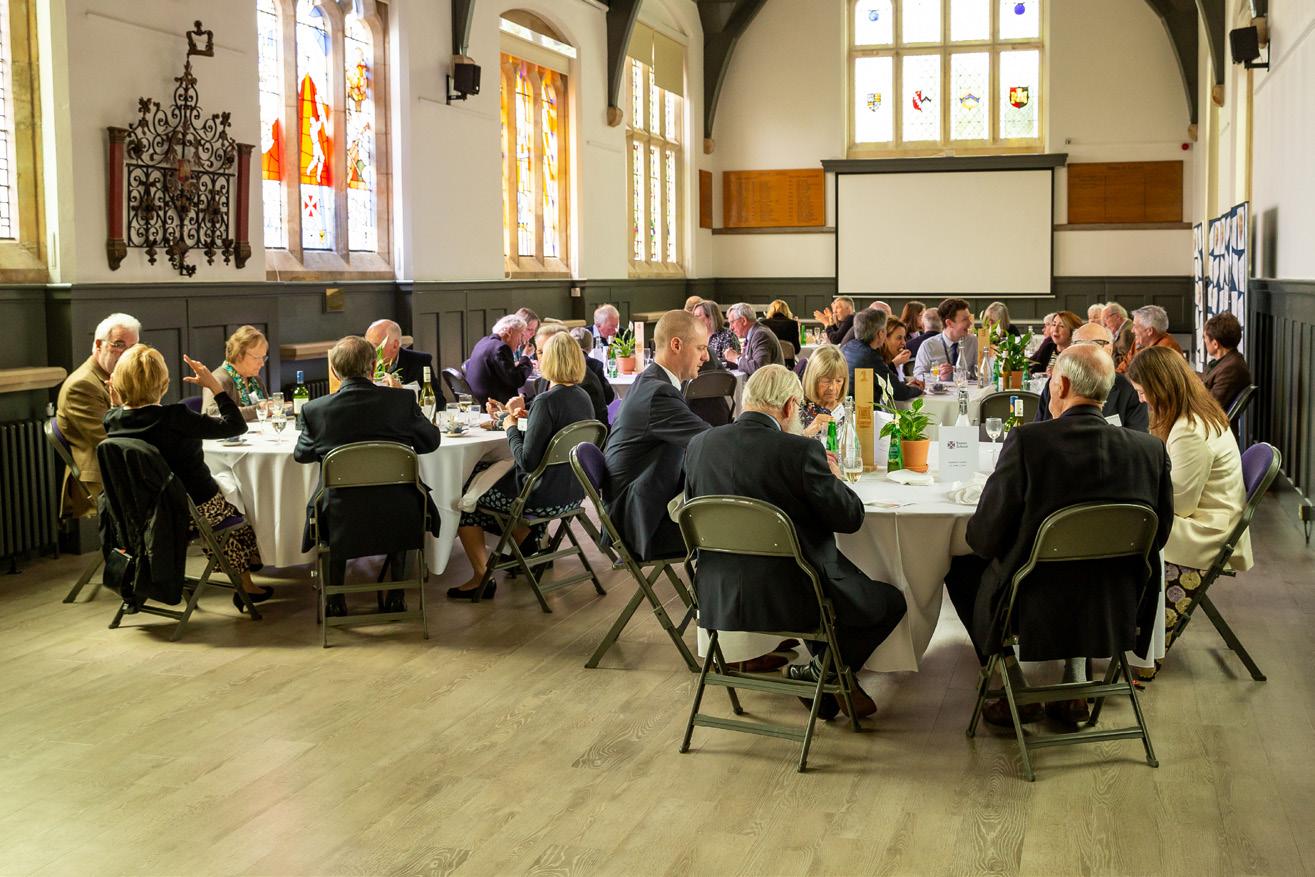
Angus and Emma Leeming
Paul and Kirsty Lovell
Miles MacEacharn (2018-present – staff)
Michaela Manning
Theresa Martin
Adrian and Sally McArdle
Robert and Catrina McCarthy
Beverley Meeke (2004-2017 – former governor)
John Mullins
Philip Mullins
Marjorie Oda-Burns
Stephen and Anna Otter
Marcus Paul
Nick Paul
Nigel and Rebecca Parker
Laurence Pearse (1951-1955)
Steve Perring (1977-1981)
Denis Pereira Gray (1943-1954)
Jonathan and Lucy Porter-Goff
Ralph and Eleanor Rayner
Ashley Retter (1985-1996)
John and Sharon Reynolds
Louise Simpson (2020-present – Head)
Samantha Smart
Martin Smith (1963-1970)
Andrew Thomas (1966-1972)
Jonny Titchin (2023-present – staff)
Nicholas Treble (1966-1972)
Ian Tweedie (1952-1959)
John Wheeler (1964-1975)
Stephen Wickers (1984-1988) and Kirsten Wickers
Steven Wise (1985-1992)
John Wolffe (1966-1977)
Kwok Wong and Rebecca Ling
And two anonymous donors
All care has been taken to ensure the accuracy of this list. However, if any error has occurred please accept our apologies and notify the Alumni and Development office so that we can amend our records.
We look forward to seeing you at one of our events, whether that’s at school or elsewhere. Please get in touch with the Alumni and Development office if you have any questions, or if you haven’t received an invitation for an event you would like to attend.
Classes of 2021, 2022 and 2023 celebration
Friday 8 September 2023
Exeter Pre-Prep open morning
Thursday 21 September 2023
Whole school open morning
Saturday 30 September 2023
Exonian quiz
Friday 6 October 2023
Sixth Form open evening
Thursday 9 November 2023
Exonians in Oxford
Wednesday 15 November 2023
Whole school open morning
Tuesday 28 November 2023
Whole school open morning
Tuesday 16 January 2024
Exonian lecture
Thursday 25 January 2024
Education festival
Monday 19 February 2024
London drinks and class of 2014 anniversary
Thursday 22 February 2024
Lower Sixth futures conference
Tuesday 12 March 2024
Exonians in Cardiff
Wednesday 13 March 2024
Class of 1954 anniversary
Thursday 18 April 2024
Donors’ lunch
Saturday 20 April 2024
St Margaret’s and Mount St Mary celebration
Wednesday 24 April 2024
Summer open evening
Thursday 9 May 2024
Exeter Pre-Prep open morning
Thursday 16 May 2024
Whole school open morning
Thursday 27 June 2024
London dinner
Wednesday 22 May 2024
OE day and anniversary dinner (’64, ’74, ’84, ’94, ’04)
TBA